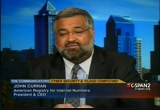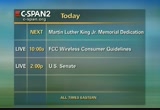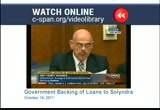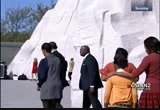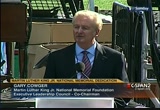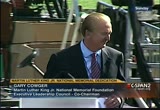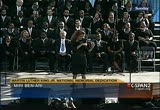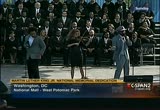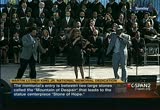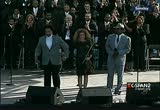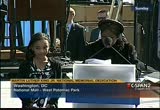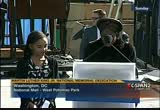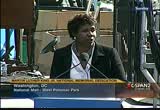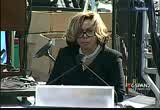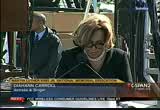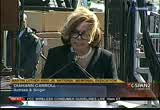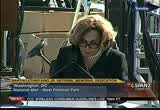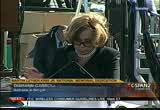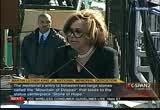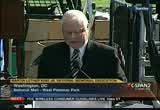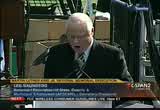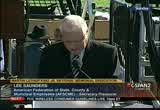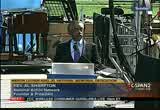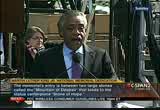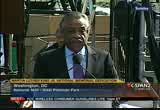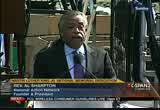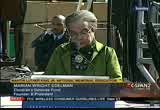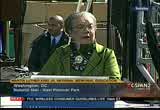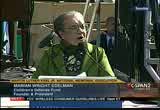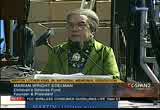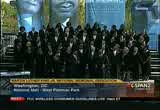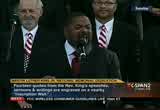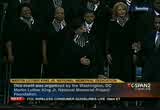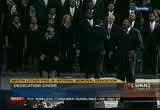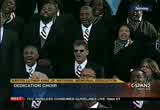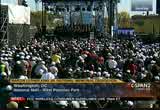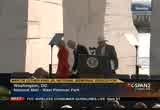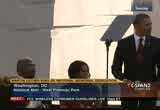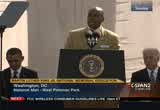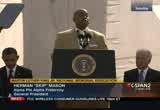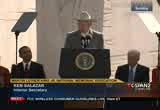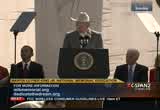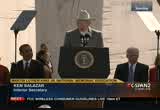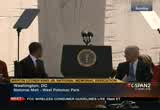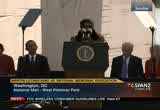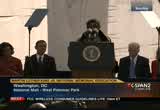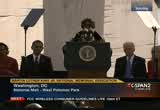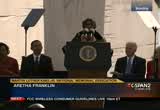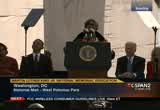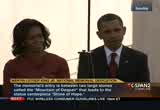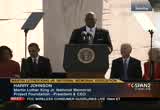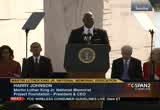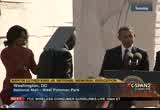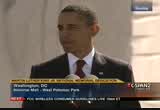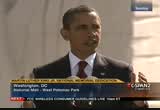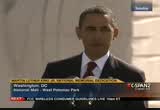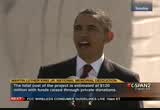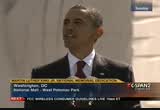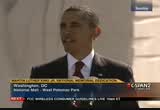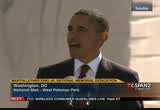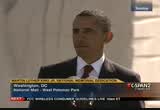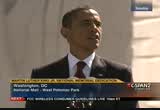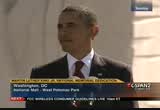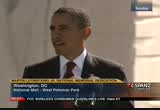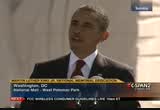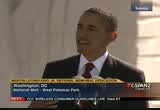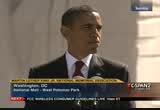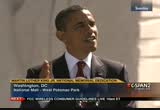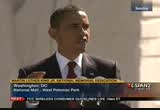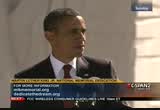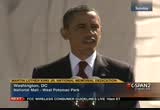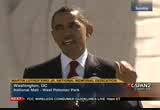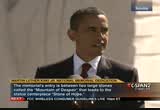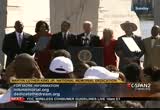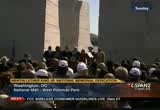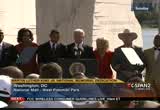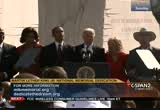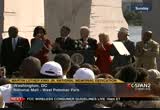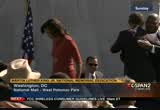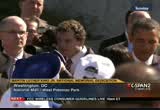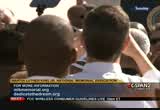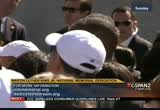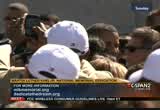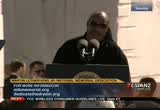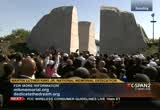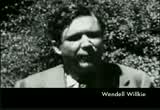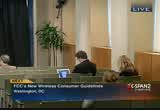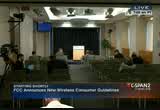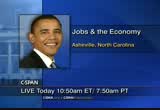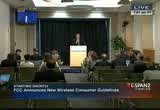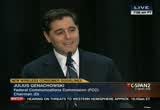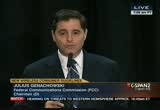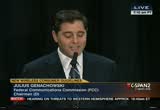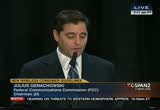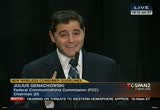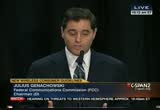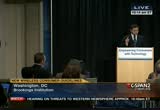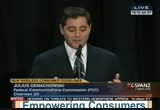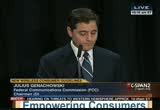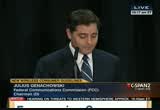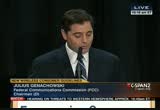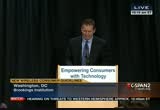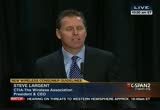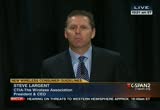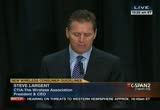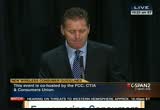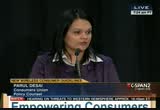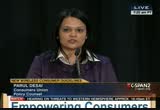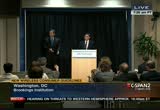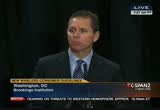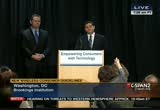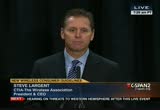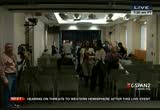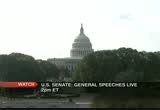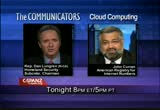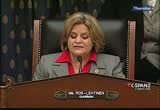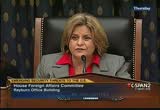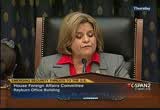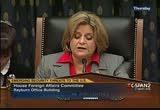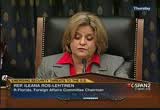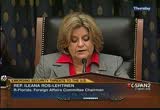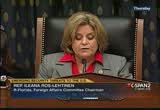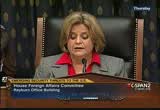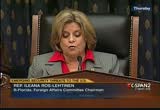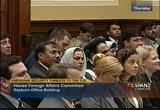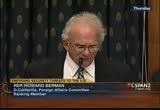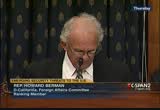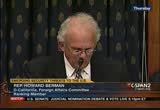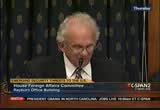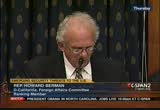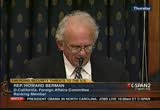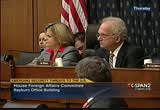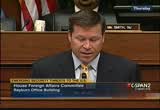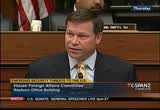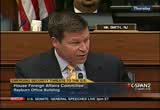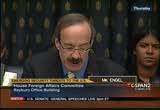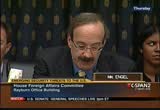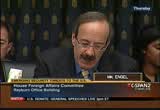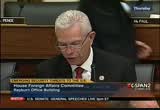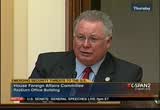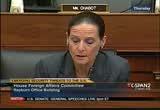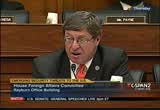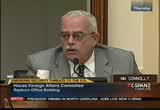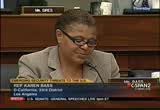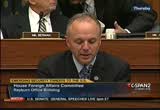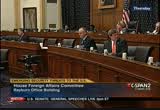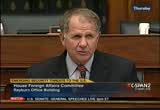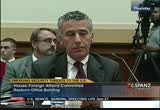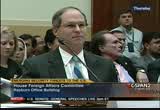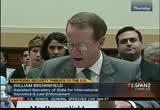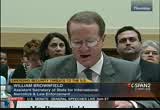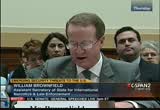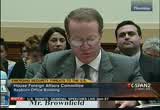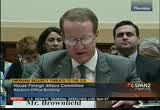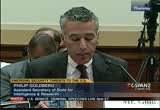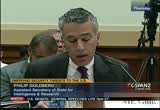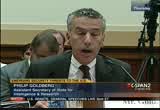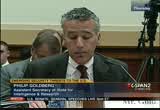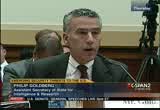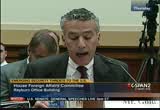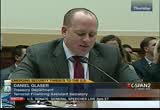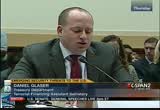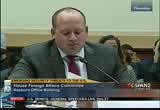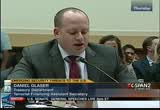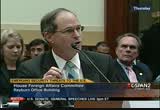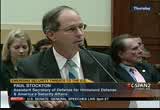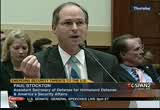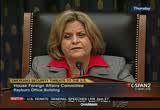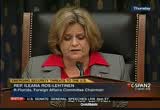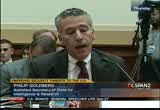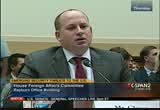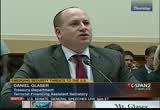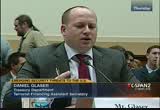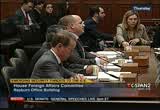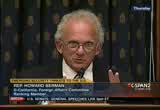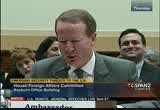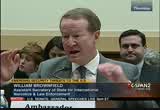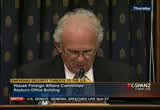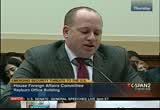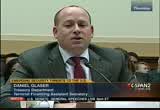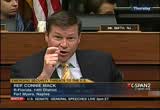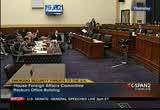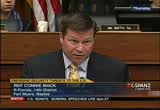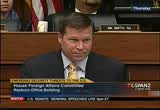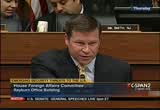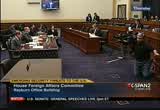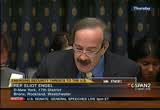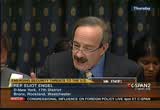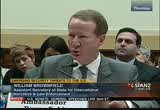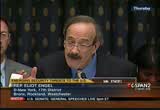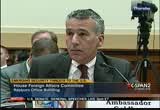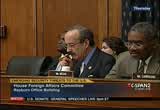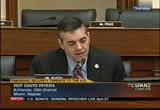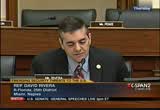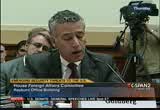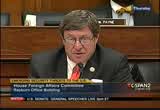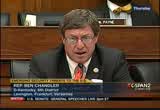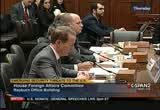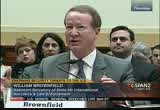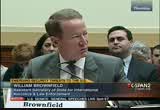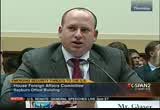tv U.S. Senate CSPAN October 17, 2011 8:30am-12:00pm EDT
8:30 am
make sure that the security controls specify where the systems are located and make sure that they specify who, what sort of citizen or what sort of background personnel have access to them. in some agencies they may look and go, oh, this cloud is outside the u.s. perhaps i don't want to use it for one of my applications, but i can use it for another one. different agencies and even within an agency you have different needs. so to answer the question, for the cloud today i don't think that you're going to see any classifieded information because that's not included in the profile, and it might be a long time before that's coming. you won't see high-risk systems, systems that could endanger an agency if compromised. but there's a lot of low-risk and moderate-risk systems today that can be moved to the cloud. an organization that is involved in cybersecurity or information that's involved in federal government planning, they may
8:31 am
decide to either keep it in house or use it in a cloud within the u.s. whereas an organization or a federal agency that's supporting workers all over the globe may want to use a cloud that's all over the globe recognizing they're making a choice, and they can see the risks they're documents. so i think we'll see low and moderate-risk operations moving. >> host: john curran is president and ceo of the american registry for internet numbers. he's been our guest on "the communicators" along with jennifer martinez, technology reporter with politico. >> host: thank you. >> coming up next, remarks by president obama and others at yesterday's dedication ceremony for the martin luther king jr. memorial in washington. then at 10 a.m. eastern we're leave with fcc chairman julius genachowski announcing new consumer guidelines.
8:32 am
and the senate's back at 2 p.m. eastern with debate on appropriations for fiscal year 2012 followed by debate and a roll call vote on a judicial nomination. >> also today president obama begins a three-day bus tour in asheville, north carolina, to talk about his jobs plan and the economy. last week the senate failed to advance his jobs bill. the white house is reportedly working with congressional leaders to break up the legislation into parts that would be considered individually. live coverage of the president begins this morning at 10:50 eastern over on our companion network, c-span. >> now, i don't object to an investigation into solyndra and based on the record to date, i don't see evidence of wrongdoing by government officials. just a bad investment decision. i don't want to minimize it. but this was a bad decision as far as we know made on the merits. >> gentleman's time has expired. >> on friday a house oversight and investigations subcommittee
8:33 am
continued its probe of the energy department's $535 million loan guarantee to solyndra a solar panel manufacturer that recently laid off 1100 workers and filed for bankruptcy. watch the entire event as well as testimony last month from solyndra and a 2010 presidential visit to solyndra online at the c-span library, archived and searchable. it's washington your way. >> president obama was among those who gathered on the national mall yesterday for the dedication of the martin luther king jr. national memorial. other attendees included actress cystly tyson and interior secretary ken salazar and musical performances by aretha franklin and stevie wonder. this portion of the ceremony is about 09 minutes. 90 minutes.
8:34 am
♪te ♪st [applause] >> ladies and gentlemen, please> welcome the chairman of the king memorial foundation's executive leadership cabinet, gary cowger. [applause] >> good morning. dan akerson, tommy be hilfiger and rod gillhamre vealed something very significant aboue the memorial we dedicated today, and that is everyone involvedjet with this project had their own story to tell as they look back to the construction of thistr tribute to dr. king's legacy. fraternity brothers, artisans, construction workers,, corporations, government officials, architects and everyday people played to their strengths and contributed what
8:35 am
they could.on so today we celebrate how thesee many came together as one to see a dream fulfilled.see as co-of chair of the foundation's executive f leadership council,ou i had the distinct honor to work side by side with incredible men and women dedicated to building an alliance of influencers, leaders and philanthropists who drove our national campaign to construct this awe-inspiringn to memorial that will forever gracl our national mall. the road we traveled while amassing this support was notam always easy, and for the core oa our executive leadership council it was a road we traveled forncl ten years. but this dedicated team made countless phone calls, arranged hundreds of meetings, hosted events and dream dinners throughout our nation all toners remind our nation what we owe the legacy that we honor today.
8:36 am
it was a decade of tireless commitment that required each of us to draw on what inspired us, and i can say for me that inspiration came from my years as a teenager when i witnessed dr. king courageously lead oured world and our country to a much-needed change. i'd like to also take this opportunity to specifically thank ambassador andrew youngfia for his extraordinary work on the council which made today in part possible. [applause] and i --, po [applause] thank you. and i'd also like to thank general motors and tommy hilfiger for serving as tremendous early examples ofles corporate and personal support for this noble cause. thankport you all very much. [applause]
8:37 am
8:38 am
8:39 am
still got here by bus. ♪ 55 years after the '55 montgomery bus boycott, our feet are soft, perhaps manicured, definitely spoil.y so ♪ now, was it muddier at the king dedication, or was it colder at barack's inauguration? ♪ some of us may have packed as many as seven pairs of shoessed just for this one weekend, but not a one prepared to nike air yourself from home to work from work to the store from the store to church and back home. ♪ to us some of us in status the bus is lower than the subway, and the subway is underground. ♪ but in '55 -- sister rosa tha didn't have an ipod to block out that noise. ♪ brownie text messages sent out after bail money, and reverend king did not tweet about monday's boycott plan.
8:40 am
♪ there was no telecommuting. these crowds got there without the aid of a smartphone, and there the was more than an impru flash mob trying to stop them. ♪ put that in your status update. ♪ our feet are soft, but they'le be a little tougher by the time we're finished marching todayghr and dancing tonight. ♪ so when you go home, embellish the legend of today. h tell your friends and family how you walked a country mile, stood in long lines and did it all in style because it was your tooth to it tooth -- duty to be here for this one day. ♪ then remind them the month.com ri bus boycott lasted 381 suchda days. and while you're here just for kicks, ride a bus. ♪ go ahead. sit anywhere you please. relax those feet. you know why? because you can.
8:42 am
[applause] >> thank you. thank you. and now it is my greats, distinct pleasure to introduce to you two special and amazing women. screen and stage star hedge jend cicely tyson -- [cheers and applause] and a rising young star, at the dawn of her career, amandala stenberg. welcome. den [applause] [cheers and applause] ♪ ♪ >> this is the day that the lord has made, and we are rejoicing, and we're glad in it!ade [cheers and applause] every great dream begins with a dreamer.
8:43 am
always remember you have within you strength, the patients, and the passion to reach for the stars in order to change this world. that quoote is from harriet tubman, a woman who really was the early champion of civil rights. the story of civil rights movement is the story of the women who at times discreetly always dedicated, and too often with little recognition, stood up to tear down the barriers between fulfilling a dream and deferring it. this story of the women of the civil rights movement is a story of our mothers, our grandmothers, our widows and
8:44 am
wives, our sisters and daughters who were powerful rattlers down dark lonely roads on the journey toward freedom and progress. they were pioneers. they were made, mothers, at least, at the present volunteers, and entertainers. they were incredible women such as harriet tubman and said turner truth -- soujourner truth. women can and all colors. , from all walks of life, to stand with dr. king and other man of the civil rights movement to map out strategies of change. there were dorothy height, rose of parks, betty shabazz, caress scott king, and the countless
8:45 am
unknown women who helped make all our lives more just and more equal. as we celebrate the dream and dedicate the memorial, let us remember a long line of phenomenal women who shaped the civil rights movement from this country's early days three today. let us remember to honor the women who came before us as well as so many, thank god, that are still here with us. they were powerful women, a powerful role models for myself as well as for the next generation of not only women but you men, too. i have standing with me a young 12-year-old member of the next
8:46 am
generation. [applause] her name is amandela which in zulu mains power. yes, indeed. so, i just have a word or two to say to amandela, that we are passing on to you the torch. you will be the next generation to pick up and carry on where i and the rest of my generation leave off. god bless you and good luck to you. thank you. [applause] >> my knowledge of the civil
8:47 am
rights movement is from what i have learned in school at what my parents have taught me. today, i want to honor four little girls of the civil rights movement. 11-year-old denise mcnair, 14- year-old addie mae colluins, carole robinson, 14, and cynthia wesley, 14. in 1963, there were killed at 16th street baptist church in birmingham, alabama when a bomb exploded while they were in sunday school. i am 12 years old. those four little girls were my age. although they did not live long enough to be recognized as women of the civil rights movement, they should be part of that wonderful legacy because, as dr. king said at their funeral, they
8:48 am
did not live long lives but they live a meaningful lives. i plan to live a meaningful life, too. [applause] thank you. >> it is now my pleasure to introduce a group both women and men who, through their beliefs, have each brought change to the world -- sharing their thoughts on hope, democracy, justice, and love -- please welcome through blazing actress and singer diane carol,
8:49 am
8:50 am
of dr. martin luther king. i am older than you think i am. [laughter] bless your heart. we try. standing here like a fool in high-heeled shoes at 77 years of age. [applause] so, you see, i knew dr. king. and to talk about dr. martin luther king is to talk about hope. the first time i met him in the early 1960's, when i was about 12 --
8:51 am
[laughter] i was really struck by what a quiet man he was. always seemed quiet, but the first time i heard him speak, suddenly, it was is it if he was bringing up fire of hope over all of us -- it was as if he was bringing a fire of hope over all of us. we all needed, desperately, a man like dr. king to turn our hopes and dreams into action. he aroused in us a total commitment to his dream, which drew 1/4 of a million of us here in 1963. in those days, i must confess that i was afraid to come to
8:52 am
washington, because it was the south and it operated like the south. i was of little girl from new york, and not always scared the girl-- i was a littlte from new york and that always scared the hell out of me. i can remember good reason for it feeling that way. taking the train from new york to visit my grandmother in north carolina -- and it was here in our nation's capital that the conductor would ask me and my family to move to the "colored" car. and i asked my mother why? what have i done? nothing, she replied. and dr. king said, nothing was not enough. we had to start doing something. and thanks to him, the hope he
8:53 am
inspired, we did, and we are. i was introduced it to dr. king in brooklyn, one evening before we were to make an appearance on a radio program. he was very young and so was i.. -- i. because i was a young mother at the time, i felt old enough to ask him why a man with a family, with the white and children, was willing -- with a wife and children, willing to live as a hunted man. even back in the 1960's, we all felt we would -- he would never lead to see his grandchildren. i will not forget, ever in my lifetime, the expression on his face when he explained that he had already put his house in order, that his wife and
8:54 am
children chose to walk with him on this journey every step of the way. my grandmother from north carolina would be the first to remind us that even moses did not make it to the promised land. his god-given purpose was to show us the way. i say it was the same with dr. king, who showed us the way. [applause] and all his children and all his grandchildren are here to continue his journey together every step of the way. i remember the day that we met because it was a little talk show, in the back of a nightclub in brooklyn. i thought, "why is he here?
8:55 am
i do not understand. this is really not a very important talk-show." but he went almost every night wherever he could speak his word. and i will love him until the day i die. his memory is something that continues, at this ton in in life -- this time in my life, to give me the strength and the courage to move on, to not stop. i do not want to be satisfied with the little television show that i did, and i was a star, but i was pleased to be there. now i am no longer please. we have to own the damn station. [applause] thank you. >> ladies and gentlemen, please welcome the secretary treasurer of the american federation of state, county, and municipal
8:56 am
employees, lee sonders. >> sisters and brothers, democracy grants each of us a seat at the table of politics and civic life. the force that should level the playing field, the promise that our voices cannot be drowned out by the powerful or the wealthy or the well-connected. i am proud to represent the 1.6 million members of my union, afscme, workers to strengthen our democracy by virtue of the jobs they perform every day in every single community across this country. in 1968, dr. king took his struggle for full democracy to memphis, tennessee, on behalf of 1300 sanitation workers, afscme mmembers -- members. the workers were demanding respect, fairness, demanding to be heard.
8:57 am
the fight in memphis became dr. king's last. he went because he understood the connection between workers' rights and civil rights. those striking sanitation workers were not simply fighting for better pay and safer working conditions. they were asserting a claim on our democracy. but today's attacks on workers rights and voters rights tell us the fight for democracy is not over. victories that for decades in the making could be undone with the government -- a governor's signature, legislative vote, or, yes, our own apathy. it could make it more difficult for millions of us to pass the vote. they denigrate the democratic principles on which we stand. but we cannot, we cannot be discouraged. too much remains to be done. dr. king issued a clarion call, a call for equality, a call to
8:58 am
make democracy reality for all of god's children, because we're standing on his legacy, we must continue his fight for the riches of freedom and security of justice. you know, there was a pastor in germany, an anti-nazi activist, who once said, first they came for this socialists and i did not speak out, because i was not a socialist. then they came for the trade unionists, and i did not speak our of because i was i not -- out because i was not a trade unionist. then they came for the jews and i did not speak out because i was not a jew.
8:59 am
then tehy ca -- they came for me and there was no one left to speak. sisters and brothers, we must always speak out. we must let our voices be heard loud and clear. we are not resting. we are not resting in the shadow of the king memorial. we are marching on! we're marching on till victory is won! together, let's restore democracy. let's restore the american dream! [applause] >> ladies and gentlemen, please welcome their rev. al sharpton -- the reverend al sharpton. [applause] >> thank you. we're here today to dedicate this memorial, but let us not be
9:00 am
confused -- this is not a monument of those times past. this is not a memorial to someone who has passed into history and that is dead. this is a marker for the fight for justice today and a projection for the fight for justice in the future, because we will not stop until we get the equal justice dr. king fought for. dr. king was not just a historic figure. he was a conduit of the spirit of justice. justice had been denied in those times. he brought us from the back of the boss. he brought us to voting rights. but we must continue to fight for justice today. justice is not trying to change the voting rights act and deny us in 34 states our right to
9:01 am
vote. justice is not executing people on recanted testimony. justice is not sending children to school that are not -- schools that are not funded. justice is not 1 percent of the country controlling 40% of the wealth. just like dr. king talked about occupying washington, just as those who are occupying wall street, we're going to occupy and take those in that stand up for justice and retire those that stand in the way. [applause] we are here to say that you're going to continue marching in the spirit -- we are going to continue marching in the spirit of dr. king. we marched through the streets yesterday.
9:02 am
we gave one message. you will not undo the king during duty will not take away the voting rights act. you will not -- you will not undo the king -- you will not take away the voting rights act. you want us to balance the budgets on what is our entitled programs. you want to mess with the social security of our seniors. that's why, when we up to vote, do not make this a partisan. when you mess with social security, this is not obama 0-- about obama, this is about our mama! it are going to vote like we have never voted before -- we are going to vote like we have never voted. when we come to the stone of
9:03 am
hope, let them come from all over the world to this stone of hope. were you fight in europe, in the middle east, africa, come here to the king monument and see the stone of hope. and when you walk through, you will see a man standing because we have hope and faith, faith that fed us when we were hungry,fai faith that clothed us when we were nekkid, faith that brought us to the white house from the eric karros. -- the outhouse. we come here a trusting in the lord alone, his holy way. he never, he never, he never failed us yet! [applause] >> ladies and gentlemen, please welcome marian wright edelman.
9:04 am
[applause] >> we honor dr. king today in granite, but what's important is that we honor him tomorrow and every day, for as long as it takes, in transformed values, voices for justice, unrelenting nonviolent action to rescue his dream and america's managing dreams from the clutches -- vanishing dreams from the clutches of militarism, racism, and poverty that he warned would undo america. in his last sunday sermon at washington's national cathedral, dr. king retold the parable of the rich man who ignored the poor man, lazarus, who came
9:05 am
every day sicking crumbs from the table. the richman went to -- rich man went to hell, not because he was rich, but because he did not realize is wealth was his opportunity to bridge the gulf separating him from his brother and allowed lazarus to become invisible. he warned this could happen in america. if we do not use her vast resources to end party and -- poverty and make it possible for all of god's children to have the basic necessities of life. when he called for the poor people's campaign in 1968, we had about 25 million poor people, including 11 million children. today, we have 46.2 million poor people, including 16.4 million poor children, who are the
9:06 am
poorest age group. where is your voice to say, stop children falling into poverty? why have we normalized and let our leaders normalize child poverty and homelessness and hunger in america? stand up and speak up for your children and their future. honor dr. king by committed action to end job poverty. i have no doubt he would be calling for another poor people's campaign for jobs and income today, and we need to close the obscene gulf between rich and poor been in our country, where the 400 highest- income earners made as much as the combined tax revenues of 22 states. they do not need a tax cut. speak up and make sure they do not take more from poor children. i will just tell you, do not as
9:07 am
think we cannot move all of this progress -- losdo not think we cannot lose all of this progress. if we do not break the cradle- to-prison pipeline, we will have a new apartheid in america. speak up and rest your children from the prison-industrial complex. -- rescue your children from the prison-industrial complex. the day after dr. king was shot, i went into a washington d.c. neighborhood, urging children not to move. at 12-year-old black boy looked at me straight in the eye and said, lady, what future? i ain't got no future. i ain't got nothing to lose. it is time for the black community, for all of us, to prove that boyd's truth wrong -- boy's truth wrong.
9:08 am
9:09 am
9:10 am
9:11 am
9:12 am
9:13 am
9:16 am
>> good morning. president and mrs. obama, vice president and dr. biden, secretary salazar, distinguished guests, friends, guests, fraternity brothers, it is with great pride and honor that i stand here as the 33rd general president of alpha by alpha attorney, dr. king's fraternity. the idea of a memorial to dr. king was concede in 1983, where so many ideas are conceived at the kitchen table with a group of our fraternity brothers led by dr. george silly. after years of perseverance, many began and great theme the single vision, led by a group of dynamic passionate present to hear.
9:17 am
i would ask that he would stand and be recognized at all brothers of alpha, which replaced him for just a moment so that you might be recognized and so that we can thank the world for their support of this great monument. [applause] thank you. you may be seated. the fraternity members join with communities across the country, federal and local governments and other hard-working people around the world on a common goal. to build a memorial celebrating and honoring our brother and the world civil rights icon, dr. king, and ideas he upheld. when secretary salazar signed a permit allowing construction of the memorial to begin in 2009, and we knew that our long held vision we be realized. thank you to all of you who have helped us to arrive here today. thank you, mr. president, thank you secretary salazar or your
9:18 am
signature. and so it is indeed my honor, my privilege and my pleasure to introduce to you the honorable ken salazar secretary of the interior. [applause] >> thank you, skip, and good morning to all of you. on behalf of president barack obama and the united states department of the interior, i am humbled am i am honored to celebrate with you the birth of dr. martin luther king, jr. memorial on the national mall as the nation's 395th national park. [applause] all of our lives we have seen and understood the legacy of dr. king. that as citizens of earth we are all one people and have a duty to stand up for equality and justice for all. today, the department of the
9:19 am
interior and the national park service had the honor of serving as one of the custodians of america's history. we have a duty to make sure that all of america's story is told, not just a part of it. and with the dedication of this memorial, we are honoring a critical chapter in america's story on the march of civil rights and the struggle to create a more perfect union. dr. king push the struggle of civil rights for all people into the consciousness of america in the world. millions of disenfranchised american -- americans don't hope, dignity and opportunity to share fully in the blessings of our nation. as i stand here before you today, this distinguished audience, my president and the first family, my vice president and his family, leaders of the civil rights movement, members of the king family, members of congress and my colleagues on the cabinet, i know we're all indebted to dr. king and those
9:20 am
who spearheaded the civil rights movement who came before us. they gave those of us in my generation the opportunity that had been denied the generations before them. i know that we are also painfully aware that dr. king's dream of equality and dignity for all people continues to elude us. discrimination is still present in communities and places around our country, and around the world. it is also at the root in the divisive battles, immigration here in america. this tomorrow today stands to his struggle for civil rights, continues today and is a much alive. we share his dreams that one day we'll all live in a world where there is dignity, respect and justice for all, with no exceptions. when our children and grandchildren visit this place, this memorial, they will share in dr. king's story, which is a story of america. it is a story, as individuals,
9:21 am
in the face and centuries of injustice, that people can summon up the courage to change the world. in dr. king's own words, i say to you, my friends, even though we face the difficulties of today and tomorrow, i still have a dream. it is a dream deeply rooted in the american dream. and in the view of my humble vision, president barack obama is a personification of the american dream. thank you. [applause] >> ladies and gentlemen, welcome to the stage aretha franklin. [applause]
9:22 am
[applause] >> good morning, everyone. >> good morning. >> what a pleasure it is to be here with you, and to be a part of this magnanimous and most historical day of remembrance for a man who was so great and so lovely. good morning, christine. how are you? i'm going to sing something that dr. king often requested, and as
9:23 am
9:28 am
9:29 am
is today. as i stand here and look across the transformed landscape, i see a wonderful example of what we can accomplish with this place and with a stone of hope. we come together today to honor and celebrate the ideals of a humble man who understood that all humanity is linked together. and we come together to dedicate the martin luther king, jr. memorial, our memorial, the world's memorial. many of you seated here throughout this day and throughout this country have contributed years of your time, talents and money to help us build the memorial we dedicate today. it has been both humbling and i'm listing -- uplifting to be a part of this magnificent
9:30 am
undertaking. our hope is that through this memorial, dr. king's legacy will continue to touch those who walked with him, those inspired by him, and future generations who will get to know him. on behalf of the martin luther king, jr. national memorial project foundation, i want to thank everyone for doing so much, so long, to help us arrive at this triumphant day in history. once more, i also thank you to my family and to the staff of the mlk memorial, a small group of folks who have worked tirelessly to make dr. king's dream a reality, right here on our national mall. and so, it is indeed with great pleasure and an honor that i have to introduce to you the president of the united states, president barack obama. [cheers and applause]
9:31 am
>> thank you. thank you so much. thank you very much. [applause] thank you. please be seated. an earthquake and a hurricane may have delayed this day, but this is a day that would not be denied. for this day, we celebrate dr. martin luther king, jr.'s return to the national mall. in this place, he will stand for all time, among monuments to
9:32 am
those who fathered this nation and those who defended it; a black preacher with no official rank or title who somehow gave voice to our deepest dreams and our most lasting ideals, a man who stirred our conscience and thereby helped make our union more perfect. and dr. king would be the first to remind us that this memorial is not for him alone. the movement of which he was a part depended on an entire generation of leaders. many are here today, and for their service and their sacrifice, we owe them our everlasting gratitude. this is a monument to your collective achievement.
9:33 am
[applause] some giants of the civil rights movement - like rosa parks and dorothy height, benjamin hooks, reverend fred shuttlesworth - they've been taken from us these past few years. this monument attests to their strength and their courage, and while we miss them dearly, we know they rest in a better place. and finally, there are the multitudes of men and women whose names never appear in the history books, those who marched and those who sang, those who sat in and those who stood firm, those who organized and those who mobilized, all those men and women who through countless acts of quiet heroism helped bring about changes few thought were even possible.
9:34 am
by the thousands, said dr. king, faceless, anonymous, relentless young people, black and white, have taken our whole nation back to those great wells of democracy which were dug deep by the founding fathers in the formulation of the constitution and the declaration of independence. to those men and women, to those foot soldiers for justice, know that this monument is yours, as well. nearly half a century has passed since that historic march on washington, a day when thousands upon thousands gathered for jobs and for freedom. that is what our schoolchildren remember best when they think of dr. king, his booming voice across this mall, calling on america to make freedom a reality for all of god's
9:35 am
children, prophesizing of a day when the jangling discord of our nation would be transformed into a beautiful symphony of brotherhood. it is right that we honor that march, that we lift up dr. king's "i have a dream" speech, for without that shining moment, without dr. king's glorious words, we might not have had the courage to come as far as we have. because of that hopeful vision, because of dr. king's moral imagination, barricades began to fall and bigotry began to fade. new doors of opportunity swung open for an entire generation. yes, laws changed, but hearts and minds changed, as well. look at the faces here around you, and you see an america that
9:36 am
is more fair and more free and more just than the one dr. king addressed that day. we are right to savor that slow but certain progress, progress that's expressed itself in a million ways, large and small, across this nation every single day, as people of all colors and creeds live together, and work together, and fight alongside one another, and learn together, and build together, and love one another. so it is right for us to celebrate today dr. king's dream and his vision of unity. and yet it is also important on this day to remind ourselves that such progress did not come easily; that dr. king's faith
9:37 am
was hard-won; that it sprung out of a harsh reality and some bitter disappointments. it is right for us to celebrate dr. king's marvelous oratory, but it is worth remembering that progress did not come from words alone. progress was hard. progress was purchased through enduring the smack of billy clubs and the blast of fire hoses. it was bought with days in jail cells and nights of bomb threats. for every victory during th him height of the civil rights movement, there were setbacks and there were defeats. we forget now, but during his life, dr. king wasn't always considered a unifying figure. even after rising to prominence, even after winning the nobel peace prize, dr. king was
9:38 am
vilified by many, denounced as a rabble rouser and an agitator, a communist and a radical. he was even attacked by his own people, by those who felt he was going too fast or those who felt he was going too slow; by those who felt he shouldn't meddle in issues like the vietnam war or the rights of union workers. we know from his own testimony the doubts and the pain this caused him, and that the controversy that would swirl around his actions would last until the fateful day he died. i raise all this because nearly 50 years after the march on washington, our work, dr. king's work, is not yet complete. we gather here at a moment of
9:39 am
great challenge and great change. in the first decade of this new century, we have been tested by war and by tragedy; by an economic crisis and its aftermath that has left millions out of work, and poverty on the rise, and millions more just struggling to get by. indeed, even before this crisis struck, we had endured a decade of rising inequality and stagnant wages. in too many troubled neighborhoods across the country, the conditions of our poorest citizens appear little changed from what existed 50 years ago, neighborhoods with underfunded schools and broken-down slums, inadequate health care, constant violence, neighborhoods in which too many young people grow up with little hope and few prospects for the future.
9:40 am
our work is not done. and so on this day, in which we and celebrate a man and a movement that did so much for this country, let us draw strength him from those earlier struggles. and first and foremost, let us remember that change has never been quick. change has never been simple, or hi without controversy. change depends on persistence. change requires determination. it took a full decade before the moral guidance of brown v. board of education was translated into the enforcement measures of the civil rights act and the voting rights act, but those 10 long and years did not lead dr. king to give up.
9:41 am
he kept on pushing, he kept on speaking, he kept on marching until change finally came. [applause] and then when, even after the civil rights act and the voting rights act passed, african americans still found themselves trapped in pockets of poverty across the country, dr. king didn't say those laws were a failure; he didn't say this is too hard; he didn't say, let's settle for what we got and go home. instead he said, let's take those victories and broaden ou mission to achieve not just civil and political equality but also economic justice; let's fight for a living wage and better schools and jobs for all who are willing to work. in other words, when met with hardship, when confronting disappointment, dr. king refused to accept what he called the
9:42 am
"isness" of today. he kept pushing towards the "oughtness" of tomorrow. and so, as we think about all the work that we must do, rebuilding an economy that can compete on a global stage, and fixing our schools so that every child -- not just some, but every child -- gets a world-class education, and making sure that our health care system is affordable and accessible to all, and that our economic system is one in which everybody gets a fair shake and everybody does their fair share, let us not be trapped by what is. we can't be discouraged by what is. we've got to keep pushing for what ought to be, the america we ought to leave to our children, mindful that the hardships we face are nothing compared to those dr. king and his fellow marchers faced 50 years ago, and that if we maintain our faith, in ourselves and in the
9:43 am
possibilities of this nation, there is no challenge we cannot surmount. and just as we draw strength from dr. king's struggles, so must we draw inspiration from his constant insistence on the oneness of man; the belief in his words that we are caught in an inescapable network of mutuality, tied in a single garment of destiny. it was that insistence, rooted in his christian faith, that led him to tell a group of angry young protesters, i love you as i love my own children, even as one threw a rock that glanced off his neck. it was that insistence, that belief that god resides in each
9:44 am
of us, from the high to the low, in the oppressor and the oppressed, that convinced him that people and systems could change. it fortified his belief in non-violence. it permitted him to place his faith in a government that had fallen short of its ideals. it led him to see his charge not only as freeing black america from the shackles of discrimination, but also freeing many americans from their own prejudices, and freeing americans of every color from the depredations of poverty. and so at this moment, when our politics appear so sharply polarized, and faith in our institutions so greatly diminished, we need more than ever to take heed of dr. king's teachings.
9:45 am
he calls on us to stand in the other person's shoes; to see through their eyes; to understand their pain. he tells us that we have a duty to fight against poverty, even if we are well off; to care about the child in the decrepit school even if our own children are doing fine; to show compassion toward the immigrant family, with the knowledge that most of us are only a few generations removed from similar hardships. [applause] to say that we are bound together as one people, and must constantly strive to see ourselves in one another, is not to argue for a false unity that papers over our differences and ratifies an unjust status quo. as was true 50 years ago, as has been true throughout human history, those with power and
9:46 am
privilege will often decry any call for change as divisive. they'll say any challenge to the existing arrangements are unwise and destabilizing. dr. king understood that peace without justice was no peace at all; that aligning our reality with our ideals often requires the speaking of uncomfortable truths and the creative tension of non-violent protest. but he also understood that to bring about true and lasting change, there must be the possibility of reconciliation; that any social movement has to channel this tension through the spirit of love and mutuality. if he were alive today, i believe he would remind us that the unemployed worker can rightly challenge the excesses of wall street without demonizing all who work there;
9:47 am
that the businessman can enter tough negotiations with his company's union without vilifying the right to collectively bargain. he would want us to know we can argue fiercely about the proper size and role of government without questioning each other's love for this country with the knowledge that in this democracy, government is no distant object but is rather an expression of our common commitments to one another. he would call on us to assume the best in each other rather than the worst, and challenge one another in ways that ultimately heal rather than wound. in the end, that's what i hope my daughters take away from this monument. i want them to come away from here with a faith in what they can accomplish when they are determined and working for a righteous cause.
9:48 am
i want them to come away from here with a faith in other people and a faith in a benevolent god. this sculpture, massive and iconic as it is, will remind them of dr. king's strength, but to see him only as larger than life would do a disservice to what he taught us about ourselves. he would want them to know that he had setbacks, because they will have setbacks. he would want them to know that he had doubts, because they will have doubts. he would want them to know that he was flawed, because all of us have flaws. it is precisely because dr. king was a man of flesh and blood and not a figure of stone that he inspires us so. his life, his story, tells us that change can come if you don't give up.
9:49 am
he would not give up, no matter how long it took, because in the smallest hamlets and the darkest slums, he had witnessed the highest reaches of the human spirit; because in those moments when the struggle seemed most hopeless, he had seen men and women and children conquer their fear; because he had seen hills and mountains made low and rough places made plain, and the crooked places made straight and god make a way out of no way. and that is why we honor this man, because he had faith in us. and that is why he belongs on this mall, because he saw what we might become. that is why dr. king was so quintessentially american -- because for all the hardships we've endured, for all our sometimes tragic history, ours is a story of optimism and achievement and constant striving that is unique upon this earth. and that is why the rest of the
9:50 am
world still looks to us to lead. this is a country where ordinary people find in their hearts the courage to do extraordinary things; the courage to stand up in the face of the fiercest resistance and despair and say this is wrong, and this is right; we will not settle for what the cynics tell us we have to accept and we will reach again and again, no matter the odds, for what we know is possible. that is the conviction we must carry now in our hearts. as tough as times may be, i know we will overcome. i know there are better days ahead. i know this because of the man towering over us. i know this because all he and his generation endured -- we are here today in a country that dedicated a monument to that legacy. and so with our eyes on the horizon and our faith squarely placed in one another, let us keep striving; let us keep struggling; let us keep climbing
9:51 am
9:52 am
9:56 am
>> is that stevie wonder? go on, stevie. >> this is an exciting day, an exciting moment. i knew in 1980, when i was in atlanta, georgia, the night before i wrote this song that i imagine us being in a march, we were marching to make dr. king's birthday a national holiday. i knew then, i touched the dreams and saw it as i did with you today at the monument. so congratulations america. congratulations, the world. [applause]
9:57 am
9:58 am
10:00 am
10:01 am
10:02 am
10:03 am
[applause] [inaudible conversations] >> once the last time i get to follow stevie wonder? but it gets better. >> you don't see too many empty chairs here. >> the opposition have attempted to picture me as the polar of liberalism. but i was a liberal before many of those men heard the word. and i thought for the reforms that the -- theodore roosevelt and woodrow wilson before
10:04 am
another roosevelt adopted and distorted the word liberal. >> he was a member of the democratic party for over 20 years switching in 1940. wendell willkie sought and won the republican nomination for president. although he lost the election he left his mark in political history speaking out for civil rights and becoming the fourth ambassador for his former opponent, franklin roosevelt. wendell willkie is one of the 14 men featured on c-span's new weekly series "the contenders," fly from a indiana friday at 8 p.m. eastern. >> next, 13 occasions commission chairman julius genachowski will announce new wireless consumer guidelines. is at the brookings institution here in washington. he will be joined by the president and ceo of ctia, and a consumer advocate. we expect a meeting to get underway shortly. this is live coverage on c-span2.
10:05 am
10:07 am
10:08 am
a great pleasure of introducing julius genachowski, chairman of the fcc. [applause] >> thank you, all, for being here this morning. i have the privilege last night of being at the memorial service for steve jobs in california, and it was powerful event for an irreplaceable american hero and visionary. one of the themes that comes out so clearly from steve jobs' life was his focus on products that bring benefits to people, real benefits to people, that have a real positive effect on our economy, and maybe above all
10:09 am
else, products and services that delight people, that delight people, and these different themes are at the heart of what we're announcing today, taking steps to make sure that mobile devices continue to delight every american that uses them. communications technologies, for those of you who know who've heard me and us speaking at the fcc on these topics, are social to our economic recovery and long term competitiveness. communication technologies are at the core of consumer products used every day by hundreds of millions of americans in every one of those consumers deserves to be treated fairly. empowering consumers with the tools and information they need to navigate the rapidly changing
10:10 am
technology landscape has been one of the federal communications commission's top priorities since i became chairman. as participant of our consumer -- as part of our consumer empowerment agenda, recracked down on bills and worked on the broadband speed test used more than 1 million times so far, and we're close to transforming the universal service fund in a way that brings massive benefits to consumers. building on these pro-consumer efforts last year, the fcc identified a growing problem we call "bill shock," and took important steps towards a solution that led to today's victory for more than 200 million wireless consumers. the solution gives consumers the information they need to save money on their monthly wireless
10:11 am
bills. consistent with the fcc's ongoing efforts, these actions harness technology to empower consumers and ensure consumers get a fair shake, not bill shock. what is bill shock? bill shock is when wireless subscribers experience a sudden, unexpected increase in their monthly bill. common cases are when a subscriber is charged for unknowingly exceeding plan limits for voice, text, or data, or get hit with unexpected international roaming charges. according to a 2011 survey by consumers union, roughly one in five americans with cell phone plans received unexpected charges on their bills during the previous year. that amounts to tens of millions of people nationwide. in an fcc forum highlights the problem, i met a woman who was shock the by an over $34,000
10:12 am
cell phone bill for international data and texting charges incurred while visiting her sister in haiti after the 2009 earthquake. we also met a man who got an $18,000 bill after his freda that down loads expired without warning. after that event, people wrote in saying, wait, this happened to us too. a business executive e-mailed to describe he incurred charges on a recent overseas trip despite buying an international plan before the trip. these are large examples. there's other examples like this, many examples in the hundreds of dollars as well, and in these times, these amounts of money make a real difference to real americans trying to get through this difficult economy. the conclusion from our work was clear. bill shock is a real consumer problem that needs to be fixed, and there are ways to do this
10:13 am
easily and inexpensively using technology that's widely available. more specifically, what we said at the time was that to treat consumers fairly, wireless companies should take three steps -- send voice or text alerts to notify consumers when they approach and when they reach monthly plan limits for voice, data, and text that would result in of raj charges. one, send an alert in advance. two, send alerts when consumers are about to incur international roaming charges not covered by their plans. one, send alerts for international plans. three, clearly disclose tool mobile providers offer to let consumers set their own usage limits and monitor their usage balances. this is particularly important because we're in a period of very healthy education of consumers when it comes to the new services. people are learning what a
10:14 am
megabyte is and how they translate to how many websites you down load, how many videos you watch, but they don't know that yet, and so finding ways to help consumers understand what meg bites are, what it means 20 their plans is important. we know what minutes are, and we can kind of do that in our head. in addition, -- those were the goals we set out for how we wanted to see wireless companies and consumers interact in this area given the documented problem of bill shock. i'm very pleased to be here today with ctia remitting the wireless -- representing the wireless industry and with consumers union to announce we are taking a major step to solve the problem of bill shock and that the wireless industry will take those three steps to treat
10:15 am
consumers fairly. they are moving forward with the solutions we identified. in addition, and this is important, these alerts will be offered for free, and automatically with no customer on opt-in required. the wireless' industry code of conduct will be revised to reflect these basic obligation and ensure that consumers receive alerts and notifications they need and the fcc has been calling for. the carriers committed to moving as expeditiously as possible to change their systems and implement these alerts. i'm grateful to ctia and the wireless industry for stepping up and to consumers union for helping ensure the commitments will help protect and empower consumers. from the start, the goal was to change practices to benefit consumers, and we have achieved that goal. now, moving forward, the fcc will take a trust, but verified approach, because the wireless
10:16 am
industry has taken steps to avoid consumers avoid bill shock, we'll monitor industry practices to ensure all carriers provide this necessary information to consumers as promised, and if we see noncompliance, we'll take action. to help ensure compliance, consumers union and the fcc will work together to launch a new web portal on the fcc website to allow consumers and anyone to see what types of alerts are provided by each member of ctia, by each company in the wireless industry. this portal allows the fcc and the public to track whether carriers have complied with their obligations. this public portal also provides a public incentive for carriers to move quickly with implementation. we'll see carriers competing to see who provides the best alerts notification to consumers. now, today's announcement is a
10:17 am
big win for consumers, and i want to thank the people who made it possible. first, ctia for your constructive engagement, proactive, and responsible action, innovating mobile devices benefit consumers every day connects family and friends linking co-workers, cline, fuel economic growth, job creation, and u.s. global competitiveness. your a,s show we can -- your actions show we can complete these goals, and we hope to free up mobile broadband for options that ensure that even as mobile demand goes up, we can have an invisible infrastructure that will help keep calls and connections from getting dropped or prices from skyrocketed. second, thank you consumers union for your leadership role in bringing this problem to the attention of the commission and the public, for your national
10:18 am
surveys establishing the scope of the problem, and throughout this process, for your laser-like focus on making sure that we achieve real benefits for real consumers. i thank you for that. thank you also for all the participants who contributed their ideas and research and the fcc's proceedings. i certainly want to acknowledge and thank our friends in congress who have taken an interest in the issue and displayed real leadership and commitment on a whole series of consumer issues including senator mark udall who dro deuced -- introduced legislation on the subject and all the other members on the senate committee of commerce as well as those of the house energy and commerce committee with their interest in the issue on behalf of consumers. they'll continue to monitor this area as we do at the fcc. thank you to the fcc staff to have worked so hard on this issue with a constant focus on doing the right thing for the american public including those in my office, sharice smith,
10:19 am
looking around for her, amy laveen, who i just saw, jees is a almond, three for three, as well as the staff of the fcc's consumer and government tam affairs bureau. i see at least two of our leaders here today, and we thank all of you. in these challenges economic times, even a small, unexpected fee on your bill at the end of the month can make a big difference. i look forward to working with all stake holders to make sure as we foster a thriving mobile economy that benefit all americans and drives real job creation, consumers are empowered and treated fairly every day. thank you. [applause] >> well, good morning, and thank you, chairman. thank you, all, for joining us
10:20 am
today, and thank you brookings institute for allowing us to use your facilities. it's greatly appreciated. last week, we had the fall show in san diego as you know. i hope you could join us on the west coast because it really was a successful event. it's a place for people to talk about wireless, what's happening now, and especially what we anticipate for tomorrow, but what always strikes me is the number of exhibiters and the variety of wireless products and services they provide consumers and businesses. it's everything from health care to education to transportation and energy. there's no question that the united states has the world's most innovative wireless industry. we have the hottest selling devices first, more 4g users than any other country, and we now have more wireless connections in the united states than we actually have citizens. that is because our members compete against each other on everything from coverage to
10:21 am
speeds to customer service, but while the members compete aggressively against each other for every customer, there's some things we agree on as an industry, not many, but some things. one of which is we need for spectrum. second, there's a baseline frame work for serving consumers we think should be part of every provider's wireless offering. that's why we adopted the ctia consumer code, and that's the reason why we're here today. i'm pleased to announce that once again, our consumer code is evolving to meet consumer needs. last week in san diego, ctia's board of directors voted to add a new wireless consumer usage notification guidelines to our code. as a result, wireless providers are going to be sending free aletters to their -- alerts to subscribers to manage their usage and avoid unexpected
10:22 am
overage charges for data, voice, text, and international roaming. they do not need to sign up for each of those four service areas. more than 300 million u.s. wireless customers will be protected against potential billing surprises by the industry's effort to help sub subscribers manage their usage. this offers customers at least two of the four notification for data, voice, messaging, and international roaming by october 17th, 2012, and all service alerts by april 17th, 2013. of course, many of the members already offer several account management tools, and as a part of the guidelines, wireless providers will clearly disclose these tools and services to cannot to help consumers better manage their usage. we appreciate fcc chairman julius genachowski, fcc
10:23 am
commissioners, the fcc's consumer and governmental affairs bureau, and each of the respective staff providing valuable insights of the development of wireless consumer usage notification guidelines. i've been at ctia since 2003, 10 you've often heard me and many others in washington talk about the concerns of excessive government regulation, especially on our industry because it has such a significant impact on the economy, jobs, and our lives. recognizing the directive from president obama to avoid unnecessary and costly regulation, the chairman and his team worked with the industry on these guidelines that will honor his and the commissions' mandate to serve and protect consumers while avoiding costly regulation. today's announcement with chairman julius genachowski shows there's a different way to get things done in this city. we also thank the team of consumers union for supporting
10:24 am
the new guidelines. on behalf of ctia and wireless industry, we're proud to provide consumers with free alerts to manage usage and prevent unexpected overage charges. it's my pressure to welcome the director of the consumers union to speak. thank you. >> good morning, everyone. and thank you chairman and congressman largent for taking this initiative forward and moving forward to help consumers. we're glad to be here with the chairman and fcc as well as to be standing alongside ctia which doesn't happen often in this town. consumer reports consistently found in its surveys that consumers are experiences bill shock as a result of overcharges that they are unaware of. we have also heard from many consumers about the heavy toll of finding unexpected charges on their cell phone bill according
10:25 am
to the fcc as pointed out could be up to $1,000. as a result, we, at consumers union, have been pushing for reforms to crack down on this problem, so today we are encouraged that the wireless industry is offering to provide free alerts to help consumers with bill shock. we understand the industry has agreed to start doing this within 12 months, but we urge them to the to the wait and urge each company to do is as soon as possible. some carriers like at&t, sprint, cox are already providing alerts. we think it's possible and consumers deserve to receive free alerts now to avoid over charges. it's important to provide tools now because they cannot afford these charges in a tough, difficult economy. consumers union is going to work together with the fcc on their website to shine a light on industry's alliance with the code of conduct and they'll keep
10:26 am
proceedings open to ensure compliance continues. ultimately, this is about helping people protect their pocketbooks, and we aplowed fcc, ctia's members for this effort to do right by consumers, and we challenge the rest of the industry to soon follow suit. thank you. [applause] >> thank you, all. this concludes the program. [inaudible conversations] >> [inaudible] >> i understand this applies to all ctia members 37 >> okay, and you said that the fcc will do
10:27 am
something if the carriers don't comply. what will the fcc do? what can the fcc do if they don't comply. >> we expect compliance, if not, we'll take appropriate action. what happens in that world, we'll see, but neither of us think it will happen. there's a commitment here to do something that's a win-win for the companies and consumer, and we expect to see the excitements carried out. >> advise them now to take action? i don't understand where the fcc has the authority to take action on a voluntary agreement. >> brooks, if there's noncompliance with the commitments, we'll take appropriate action, and thing the ctia understands there's no upside to not following through with the commitments. would you agree? >> i just say we had a consumer code in place for eight years starting the consumer code when i first came to ctia, and there's never been compliance issues with any of the items on our consumer code, and we don't think there's any compliance
10:28 am
issues with this particular addition to the code anyway. >> [inaudible] >> i think that's something you have to ask the members who introduced the legislation. i think that all of us involved in this are confident that the steps that we wanted the industry to take for consumers will be taken. >> [inaudible] >> right now, we're calling for implementation of the guidelines. they meet the needs that serve consumer, and we're all going to focus attention on working, helping, making sure it happens in providing this portal that will make visible the rate of progress. again, it's a win-win for everyone. [inaudible conversations] >> why do consumers have to wait a year or year and a half for
10:29 am
this top implemented? >> it's not easy to do. it's not simple to notify customers of all four different areas of those kinds of alerts. those are not easy to do, especially when talking about over 300 million people in this country, so it's not easy to do. there's systems that have to be changed, and the chairman of the fcc, we came to an agreement on how long is reasonable. i would tell you that, for example, we announced at the show that there was an agreement that we had made to introduce what was -- to attach the phones to rechargers, rechargers that we've implemented that particular proposal three months ahead of schedule. my anticipation it will be implemented before the deadlines, but we have those deadlines in place to ensure that all carriers are moving forward with this. >> i would second that. i think what we'll see by virtue
10:30 am
of how this is being implemented including the open and transparent website, i think we'll see competition among carriers on the basis of providing the best service to consumers to come back to the steve jobs idea, we're going to see as a result of this, more competition from carriers to really delight consumers in every aspect of what they do, including how the charges work and whether the alerts meet the needs that obviously consumers have, so i think we've set this topic on an excellent course, and i'm optimistic about the roll out that we'll see, so thank you, all, very much. [inaudible conversations]l
10:31 am
10:32 am
eastern for general speeches. legislative work starts at four with a generation of funding the agriculture, commerce, justice, transportation, and hud departments, and at 5:15, turning 20 a judicial nomination with a vote 15 minutes later. watch the senate live at 2 eastern right here on c-span2. >> we shouldn't shy away from or somehow be afraid of cloud computing. it is a part of the advanced development of the computer world. the problem that we face today is there are no standards to quickly move data from one cloud provider to another, yet this capability is required for good responsible contingency planning. >> tonight, on the communicator, the nature of cloud computing for the u.s. government with the head of the chairman committee on cyber security and john
10:33 am
curran at eight eastern on c-span2. [inaudible conversations] >> cabinet officials discuss threats to u.s. security in a hearing before the house foreign affairs committee last week. william brownfield, the assistant secretary of state for law enforcement, said the mexican government is working hard to period of prevent terrorist organizations as using the border as a portal into the united states. this hearing is about an hour and ten minutes. [inaudible conversations] [inaudible conversations] >> the committee will come to order. i'd like to recognize the visiting delegation from the afghan national assembly. we have 16 members of parliament
10:34 am
from the afghan national assembly, mostly from the budget and economic committees. we have -- we have the secretary of the budget committee, the chairman of the budget committee, we have many important folks here, and the delegation is here to observe how hearings operate in the house, good luck with that, and if you could please stand. i know you are over here and over here as well. thank you very much. [applause] thank you, thank you, ladies and gentlemen, it is an honor for us to have you visit our committee, learn from our mistakes, and get a good democracy going there in afghanistan. we are so appreciative of your efforts and your hard work. thank you so much for honoring us with your presence. after recognizing myself and my
10:35 am
friend, the ranking member for seven minutes each for opening statements, i'll recognize the chair and the ranking member of the subcommittee on western hemisphere for three minutes each and then one minute for any members who seek recognition. we'll then hear from the witnesses, and without objection, the witnesses prepared statements will be made part of the record. members may have five days to insert statements and questions for the record subject to the length limitations in the rules. the chair now recognizes herself for seven minutes. in light of this week's foiled iranian terrorist plot to be executed on american soil, this hearing could not be more timely. i want to commend the work of the dea and the fbi and all of our outstanding agencies for their incredible work in uncovering the plot. i applaud the efforts of all law enforcement personnel and
10:36 am
intelligence officers that continue to protect our homeland and keep us safe. kudos also to the mexican agencies who collaborated with us in making this a successful operation. the issues to be covered by this hearing has been a priority, have been a priority for many of us on this committee for some time as we sought to develop legislative policy and the responses to counter iran's increasing activities in the western hemisphere, the threat of islamic extremists in the region, and the threat posed by the narco-trafficking networks with violence and also as ready-made networks to facilitate and support other terrorist activities throughout the hemisphere including right here in the united states as we saw in that plot. we must stop looking at the drug cartels today solely from a law enforcement perspective and consider designating these trafficking members as foreign
10:37 am
terrorist organizations, and their leaders as specialize designated nationals if they are providing material support and assistance to other foreign terrorist organizations and especially designated nationals and their state sponsors. the foiled iranian plot also underscores the need to assess current u.s. strategy and determine what actions the united states must now undertake looking beyond existing initiatives to con front the evolving security threat challenges in the western hemisphere. the u.s. provided nearly $2 billion in security related assistance to the countries in latin america and the caribbean in the last fiscal year. is this assistance advancing u.s. security objectives and what has been the intangible returns on this investment? while crime in central america increases, our counter narcotic
10:38 am
support is limited. as central america is ripped apart by drug violence, the state department continues to dull out counter narcotic funding to regimes elsewhere in latin america actively working against u.s. interest. in bolivia, for example, states providing $15 million for fiscal year 2011 to fight drug trafficking and yet bolivia is actively working against u.s. interest, withdrawn from the single con vens of narcotic drugs in the u.n. and the former drug chief, general rene was sentenced last month to 15 years in prison for drug smuggle charges. in peru, state has spent over $70 million in two fiscal years on counter narcotic programs, but according to the office of national drug control policy, cultivation increased in 2010 by
10:39 am
33% leading to a 13 all-time high -- no pun intended. further, the new peru administration temporarily suspended coca e eradication programs 24 year. there's no question that equipment and technology is necessary for protecting the integrity of this region from drug cartels, from extremist groups, and from rogue regimes, and i'm pleased to see many countries in the region, such as colombia, assuming a more active role in taking on these threats; however, venezuela and brazil's increasing purchase of advanced lethal military qiement qsh equipment from russia and china is troubling and could lead to an arms race in the region. as we formulate and implement our policy, it's crucial we understand the transnational nature of the illicit
10:40 am
individuals and groups of whom we are targeting. rogue regimes, extremist groups leverage the resources of the sympathizers to strengthen their capabilities in the region and advance their hate-filled agendas. for years, the state department reported on the fundraising activities of hezbollah and hamas in the region. this week's foiled plot contributes to the growing evidence of the potential links between these groups and the drug cartels as we know such a linkage was not made because those were our guys posing as members of the drug cartels, but it seems that our sworn enemy, iran, sees a potential kindred spirit in the drug cartels in mexico. we see report on the expansions of the farq in west africa with potential links to al-qaeda in
10:41 am
the lands of islamic -- they aligned alba countries in latin america, inaugurated a military academy in bolivia to educate and train their forces, and we know that cuban intelligence officers are empower embedded throughout the venezuelan government as well as spreading throughout the hemisphere working against u.s. national security interests. we learned venezuela and cube ban foreign ministers led a delegation with leaders from ecuador, bolivia, to syria to meet with alasad to show support of brutal attacks against his own people. a department of defense report from last year stated that iran's quds force has "increased presence in latin america, particularly venezuela." the instability of the -- this
10:42 am
reminds us our homeland security is at stake. we have to take action to counter these threats and not waste valuable resources on misplaced diplomacy with those who seek to do us harm, so i thank all of our witnesses for being here today, and i'm now so pleased to turn to my friend, the ranking member of our committee, mr. berman of california for his statements. >> well, thank you so much, madam chairman, and i join you in welcoming our brothers and sisters from the afghan national assembly. i hope nothing you see this morning will cause you to lose faith in democracy, but we welcome you here, and what you'll probably see a little bit of is some disagreements with hopefully not being more disagreeable than usual, and we're glad to have you here. this is our first full committee
10:43 am
hearing that we've had this congress that touches on our own hemisphere, and the title is revealing. while there's certainly security issues in the region that deserve our very close attention, like the foiled plot to murder the saudi ambassador, i think it is a mistake to view our neighborhood as a consolation of threats rather than a series of opportunities. this approach is not only out of date; it has a real cost for the united states. in the first term, the administration of george w. bush emphasized threats and confrontations in the americas. in the second term, they adopted a different tone. why? because it became painfully clear that his initial approach did not serve u.s. interests, and, in fact, it did considerable damage. the u.s. is still recovering from the colossal loss of
10:44 am
influence in the region that resulted from those policies, and our constant post-9/11 lectures on terrorism to a region that has suffered from home grown terrorism for 50 years left a bad taste. today, much of latin america perceives that we hold them at arm's length or worse as the title of this hearing implies rather than we see them as a problem rather than as partners. to its credit, the obama administration signaled early on that it understood the need to chart a different course. in his speech to this region's leaders, a few months after taking office, president obama sought to diffuse the threats and security legacy by emphasizing that trust has to be earned over time and pledging that the u.s. seeks and equal partnership in the hemisphere. all of us, he said, i quote, "must now renew the common stake
10:45 am
that we have in one another." this administration has made significant strides in regaining that damaged trust as well as the influence that flows from it. the president's trip to the region this past march was understated, but it was self-assured and purposeful. secretary clinton's frequent presence and engagement in the region paid great dividends. in the first state of the union speech, president obama said our power grows through its prudent use, our security emanates from the justice of our cause and the force of our examination. nowhere is this notion more fitting than in our own hemisphere, and much more needs to be done. to be sure, the u.s. must remain aware of all security concerns in this region, and the list is long. it ranges from the fight against barbaric drug cartels in neighboring mexico to the possibility of mass migrations to the u.s. from cuba or haiti.
10:46 am
these issues must be placed in a policy context and in a frame work that permits the u.s. to understand and forcefully pursue its strategic interests and its values. the witnesses before us today represent bureaus we deal only with as some call it the drugs and thugs issues in the western hemisphere. this is no reflection on the panelist whose work i hold in the highest esteem, but it paints a skewed incomplete picture of our relationships with our neighbors. assistant secretary brownfield, because of your past work in the state department bureau best positioned to frame the issues for us, the bureau of western hemisphere affairs, i look to you to help us understand the complete picture. just last week, the western hemisphere subcommittee held a second hearing intended to peddle the notion that in the fight against the drug cartels, mexico is facing a full scale
10:47 am
insurgency from politically motivated terrorists. then a republican candidate for president declared in cavalier fashion that we should send u.s. troops into mexico. this is a clear slap in the face of our mexican neighbors and particularly to our ally president calderón on an issue both presidents declared is a shared problem and requires a true poip to solve. it is clear our policy towards the region is based on solid factings, and yet we sometimes chase ghosts or create caricatures of security threats. we have to condemn the bombings of the israeli empower embassy and the amia cementer in or argentina by iran and hezbollah back in the 1990s, and if the foiled plot to murder the saudi ambassador on u.s. turns out to be true, and i assume it is, this would represent a significant escalation of
10:48 am
iranian government terror tactics rem necessary sent of actions in argentina decades ago. at the same time, the persistent and bizarre statement iran built a large station in minagra1 untrue and attracts a serious discussion of the true nature of the threat and what we should do to prepare for it. this is neither a semantic nor academic comers. the stakes are real and high. this is the biggest trading partner and energy supplier. we apyre to the same values. the constitutions of the country are based on ours. with we don't keep relations on the right track, there's a real risk that the biggest threat facing the united states could become our own ability to take advantage of the irreplaceable ties we enjoy with the diverse
10:49 am
and dynamic countries of our hemisphere. i yield back. >> thank you so much. yielding three minutes to the subcommittee on western hemisphere chairman mr. mack of floured who does not -- florida who does not peddle, but put forwards assessments of the threats our allies face. >> thank you, madam chair, and i want to say i want to associate myself with all of your opening statement and thank you for your leadership, and i also would like to -- for those who are watching or paying attention to this -- you could not have seen or heard more of a clear difference in direction than from the chair of the committee and the ranking member. the idea that we are going to be safer in our hemisphere, which is a shared desire by all of the
10:50 am
countries in the western hemisphere, that this administration has somehow improved our security in the western hemisphere, i think is mistaken, short sided, and unrealistic. not wanting to address the real threats creates opportunity for those that wish to do harm on the united states and other countries in latin america. i have been suggesting and proposing for years now that hugo chavez be placed on the state list of terrorism. there's no doubt he supports terrorist nations whether it's the farq or iran. we know that there are flights from iran into venezuela that go unchecked, and that has to stop, and chavez needs to be held
10:51 am
accountable. we also know that in mexico, the situation on the ground has changed. there's no denying it, and we've had two hearings in the western hemisphere focused on mexico, and the evolution of the threat of the drug cartels, and i think what we've seen over the last couple days with the plot to assassinate -- this assassination plot, highlights the work of our committee in defining what is happening in mexico with the cartels as an insurgency that uses terrorist activities to further its cause. you cannot deny it. now, you might have a disagreement about wanting to label it as an insurgency for political means, but i think if you're unwilling to identify the problem correctly, then you are
10:52 am
unable to properly put a policy forward to help combat it. i will say this. our friends in mexico, we share the same goal. we want freedom, security, and prosperity for all of our people. we -- mexico doesn't want guns and cash moving south. we don't want drugs and terrorists moving north. we must do something about our border. we must secure our border. i think the challenges in the western hemisphere can be overcome. things like the free trade agreements that passed the house yesterday are very good starts. unfortunately, it took a long time for those to come, and i've had meetings with the presidents of panama and colombia where they've almost gave up. i'm glad to see we passed those. madam chair, thank you for the time. there's a lot of challenges, and
10:53 am
i appreciate this hearing today. >> thank you so much, mr. mack, on your leadership on the issues, and another leader from new york is the ranking member on the subcommittee on western hemisphere, and he's recognized for three minutes. >> thank you very much, madam chairwoman, thank you for holding this important hearing today. as the ranking member of the western hemisphere subcommittee, i'm aware of your long standing interest in the region and it's good and the committee is paying close attention to the issues that affect our friends south of the border. today's hearing focuses on security and emerging threats in latin america and the caribbean. these are important topics, and this committee is right to focus on them. tuesday, we learn the elements of the iranian government tried to hire mexican drug criminals to murder the saudi ambassador. with work of dea, fbi, and cooperation of the mexican
10:54 am
government, we app e prehennedded perpetrators before they carried out the terrible plot. we spent time expanding coordination with mexico, colombia, and others in the region interrupting a drug and crime flow through the caribbean and central america and keeping a close eye on the relationship between venezuela and iran. as chair of the western hemisphere subcommittee during the previous four year, i held hearings on all issues, and i consider them serious and worthy of our attention as i new the new chairman, mr. mack, does as well. we must recognize the issues of the region extend beyond security. during my ten year in the chair, the subcommittee covered poverty, inequality, relief in haiti, press freedoms and other issues. i share the concern and i applaud this hearing, but i want to reiterate, we must not also forget the issues that affect the western hemisphere are beyond security and the u.s.
10:55 am
relationship with the countries in the region extends significantly beyond the threats and dangers which this hearing will rightfully bring out. yesterday's passage of the klumon, panama, pleased to vote for both, are only examples of the issues connecting us to the hemisphere. the u.s. shares cultural, linguistic, social, and other links with our southern neighbors. i have long said one of the major problems involving security south of our border is the obscene number of american guns which flow down illegally south of the border, come into the country illegally, and go south to mexico illegally. president calderón told me permly he believes 90% of the crimes committed by the drug cartels are committed with weapons coming from the united states south into mexico. if we stop that flow, imagine how much we could stop the cartels and the drug violence. as we move ahead with today's
10:56 am
important hearing, let's remember that security's one component of the rich relationship the u.s. has with latin america in the caribbean, but an important component, and i'm pleased, madam chairwoman, that you called this important hearing. thank you, i yield back. >> thank you so much. mr. engel. pleased to welcome mr. johnson of ohio for one minute is recognized. >> thank you, madam chairman, and thank you to the witnesses for being here. we tend to envision serious threats coming from far across the ocean, one or the other. what's happening in our own hemisphere is just as important if not more so. it's epsz -- especially disconcerning when these threats represent a joint venture with those who declared the destruction of the united states as one of their stated goals. of course, at the hearing today, i'm remiss not to mention the uncovered terrorist plot of earlier this week in the alleged
10:57 am
role the western hemisphere played in facilitating a planned attack on american soil. iran's continued interest in partnering with nations close to home is a danger to the national security, one that should also draw focus to iran's interest in conducting mineral exploration in countries that just happen to have a large unexploited yiewn rain yum deposit, and with, that i look forward to the testimony from our witnesses today. >> thank you, sir. mr. -- [inaudible] welcome to our committee hearing. i'll be brief and hope this serves as a wakeup call to the country. iranians are not in my other place other than to try to destabilize and to cause us much disruption to the country as possible. i believe that in my heart, and i hope we wake up to the fact,
10:58 am
and i always believed we should take a regional approach to the security of this country, especially when it comes to south america and central america. the effort is a great effort, but i think more regional approach should be taken. with that, i yield back my time. >> thank you very much, sir. ms. schmidt of ohio? >> thank you. i want to entail on the plot of the ambassador of saudi arabia by an operative living in texas illustrates the dangers that we live in. this gentleman attempted to hire a presumed drug cartel member from mexico to help carry out the deed, and it showcases what illegal drug activities do to our national security: venezuela's close relationship with iran and its tentacles in the western hemisphere raises further concerns.
10:59 am
more investigation to illegal activities occurring are critically necessary and three questions need to be addressed. first, exactly what are the threats to our national security in the western hemisphere? how deep are they? how penetrating and what kind of threats do they pose to our allies? two, what are we doing to address these threats? three, what can be done better and what more needs to be done, and i'm looking forward to the testimony, and i yield back. >> thank you, ma'am. mr. chandler is recognized. >> thank you, madam chair. i just am very interested -- i want to thank the panel for being here. i'm very interested to hear exactly what it is we are not doing that we ought to be doing, particularly vis-a-vis mexico, what the solutions you all have. i think all of us have a sense, generally, of what the threats are. what are the solutions? what can this country actually
11:00 am
11:01 am
clerical circles and in mahmoud ahmadinejad's regime were not aware of this plot and it seems to me the policies of the united states government has to be evidence to the contrary provided by that government that we will hold them accountable as if they plotted this from the highest halls of government in tehran itself. >> miss bass is recognized. >> thank you, madam chair. from the comments and opening statements by my colleagues on both sides of the aisle we recognize there are important challenges that must be addressed within the region. the united states and other western hemisphere nations must increase cooperation and collaboration to successfully and effectively address emerging challenges. while i know this hearing is focused on the challenges and the threats in the western hemisphere there are a couple of positive examples and i thought i would highlight those. the u.s. has played a critical
11:02 am
role in recovery efforts in haiti since the devastating 2010 earthquake. the u.s. in close collaboration with the peru mine action center have successfully located and destroyed more than 3900 land minds left over from the 1995 conflict between peru and ecuador. the department of state continues to pursue pathways to prosperity which links western atmosphere countries committed to democracy and in this regard, one question i hope that will be answered is why we don't have ambassadors to ecuador and bolivia. maybe that will come up in the testimony of the witnesses. >> thank you so much. mr. deutch of florida. >> thank you, madam chairman, ranking member berman and i thank the witnesses for being here today. the events of this week leave no doubt that the iranian regime is expanding its presence dangerously so in the western hemisphere. while we've been aware of the iranian presence in south america for some time, the possible pink between the foiled terror plot and the dangerous
11:03 am
mexican drug cartel is particularly troubling. there's no doubt the iranian regime is looking for additional opportunities to expand its sphere of influence in the regime seems to have found a willing partner in mr. chavez. over past years jointly owned venezuelan and iranian banks have allowed the iranian banks to continue move money throughout the international banking system and in turn continue to fund its elicit activities, nuclear activities, and be the leading state sponsor of terror. just how venezuela benefits from these efforts and the effect of the rest of the region remain unclear. as i've said before, identify learned about the exploitation of the triborder area by terrorist organizations through arms and drug trafficking, document and currency fraud and money laundering why we know iran's proxy has benefited from manager from the triborder area and i look forward to hearing from the witnesses today. >> mr. poe from texas the vice chair on the subcommittee of oversight and investigation.
11:04 am
>> the western atmosphere has been ignored for a long time. i think we're starting to remember that what happens to our south is important to our national security. everyone south of the border of the united states is our neighbor after all. president monroe back in 1823 announced of a doctrine called the monroe doctrine. many of us learned this in school. i don't even if it's taught in school anymore. i would like to see if it plays anymore if it's been part of our national policy or replaced by something else. certainly it's still the policy of the u.s., iran violated the monroe doctrine and i'd just like to hear y'all's input of the philosophy of the monroe doctrine. being a border state with mexico, i think security is an issue. 663 individuals came from
11:05 am
special interest countries that were caught by our law enforcement at the border. and i'd like to hear more about that and we need to, i think, label the drug cartels as foreign terrorist organizations and deal with them accordingly. thank you. >> thank you so much. mr. poe, 'cause that's just the way it is. and i thank all of our members for wonderful opening statements and now we're so pleased to turn to our witnesses and welcome them. first an old friend of our committee, william brownfield, the assistant secretary for the bureau of international narcotics and law enforcement affairs at the department of state. prior to his appointment, ambassador brownfield served as u.s. ambassador to colombia from 2007 to 2010. and ambassador to venezuela from 2004 to 2007. welcome. it's great to see you. next i'd like to welcome philip goldberg he's assistant secretary of the bureau of intelligence and research at the
11:06 am
department of state. he previously served as the coordinator for implementation of united nations security council resolution 1874 on north korea and as u.s. ambassador to bolivia from 2006 to 2008. welcome, mr. goldberg. and i'd like to welcome also daniel glaser, he's the assistant secretary for terrorist financing in the office of terrorism and financial intelligence at the department of treasury. prior to this position, mr. glaser served as treasury department deputy assistant secretary, sorry, for terrorist financing and financial crimes since november, 2004. welcome, mr. glaser and finally i'd like to welcome paul stockton. thank you, sir. he's assistant secretary of defense for homeland defense and america's security affairs. paul is responsible on homeland defense activities. defense support for civil authorities and western
11:07 am
hemisphere, security affairs for the department of defense. i thank all of our witnesses. i kindly remind you that your prepared statements will be made a part of the record. and if you could limit your remarks to no more than 5 minutes, and without objection your written statements will be inserted into the record. we will begin with ambassador brownfield. >> i thank you madam chairman, ranking member berman, ladies and gentlemen of the committee, thank you for the opportunity to appear today. madam chairman, i've been in the foreign service for 32 years. i mention this not just to make you feel sorry for me but to suggest that the answers to today's team emerging threats and security in the western atmosphere have evolved over time. we're providing a snapshot of a moving train. in many ways the speed and direction of that train are determined by our own policies
11:08 am
and program. if you had asked me to assess major threats in 1980, i would have pointed to guerrilla insurgencies both inside and outside of the hemisphere. in 1990 i would have answered huge vertically integrated colombian drug cartels controlling all trafficking in the andes. in the year 2000 i would have said that the threat was the nexus between drug traffickers and guerrilla insurgencies in colombia and peru. in 2007, i would have argued that the most serious security threat to the united states had moved to mexico where criminal cartels produce, traffic and market their product into the united states. today, i believe our greatest threat has moved to central america where traffickers and criminal gangs now facilitate the flow of up to 95% of all
11:09 am
cocaine reaching the u.s. and threaten the very governments themselves. madam chairman, i suggest there is cause and effect here. we correctly focused on central america in the 1980s. and the cartels grew. as we broke the backs of the major cartels, smaller traffickers developed an unwholly alliance with the colombian farc and dln and the peruvian cartels. mexican cartels filled the void. and as the initiative begins to bite against those cartels, we see them moving into central america. we still face security threats from drug cartels, guerrilla movements, organized crime and trafficking networks. but our job is to stay ahead of the emerging threat.
11:10 am
right now i believe that is central america. the president made that clear last march when he announced his central america citizen security partnership. our tax cal challenge is to provide additional resources for south american law enforcement and security programs, link the governments more closely together in regional efforts, engage other partners and support our essential plan colombia, merida initiative and caribbean basin program. and we very much appreciate the committee's support in this effort. the committee asked us to consider as well security threats from outside the hemisphere. they may not be as great as those from within but they very definitely exist. i served three very long years as ambassador to venezuela. when i arrived in 2004, the
11:11 am
diplomatic list showed fewer than 10 diplomats assigned to the iranian embassy. when i left in 2007, the number was above 40. iranian ambassador never told me what his people were doing, but i assume they were doing something. and if you had asked me when i left argentina in 1989 the prospects for massive terror attacks within five years supported by the iranian government that would kill more than 100 innocent people in buenos ares i would have said that probability was very remote. i would have been wrong, dead wrong. members of the committee our mission is to assess the threats to the western hemisphere and to have projects to solve them. i believe our highest priority right now is central america but we cannot lose sight of mexico, colombia, the caribbean and the
11:12 am
andes. we must look ahead to tomorrow's priorities. i see an emerging trafficking threat from south america across the atlantic and across europe and back to north america and we must not lose sight of the external players in our hemisphere. we did that in the early 1990s. we should never do that again. madam chairman, i thank you for this opportunity and i look forward to your questions. >> thank you, mr. ambassador. now we'd like to hear from ambassador goldberg. >> thank you, madam chairman, and ranking member berman and members of the committee. thank you for this opportunity to be with you today. although much of the western fever is experiencing strong economic growth, improving social conditions, and increasingly consolidated democratic institutions, there continue to be some threats to u.s. interest in the region and indications of new threats from outside the region. the drug threat to the united states continues to emanate
11:13 am
primarily from the western hemisphere. the flow of drugs fuels violence in mexico and contributes to the survival of terrorist groups in colombia. populace governments continue to work to undercut u.s. influence in the region. we are concerned about increasing iranian activities in the hemisphere and in particular by the charges and individuals directed by elements of the iranian
11:14 am
11:15 am
counternarcotic strategy with aerial and manual eradication eroding one of the farc's primary revenue resources. despite these success, colombia still faces significant security challenges. the farc remains the largest terrorist group in the hemisphere with over 8,000 insurgents. it continues to traffic in drugs, and inflict casualties on the military and police on a regular basis. in addition, criminal bands have emerged as a threat to public safety having consolidated control over cocaine production and trafficking in some areas of the country. in addition, inr, the bureau i represent continues to track connections between the venezuelan government and the farc and the eln. in july, 2010, the colombian government publicly exposed the presence of farc in venezuela. in the first half of 2011, the venezuelans took stronger action against the farc arresting two of its members likely in response to the diplomatic
11:16 am
outreach initialiated by president santos. inr is working on the stability that raul castro has combat economic deterioration on the island. these plans are proceeding solely and the regime strictly limits and suppresses dissent. although some changes are underway, others will take much longer if they are instituted at all. despite the consolidation of democracy in much of the hemisphere, some countries continue to suffer a decline in the quality of their democratic institutions. in some countries, we see a narrowing of freedoms of speech and dissent, a delegitimatization of political opposition and a weakening of independent legislatures and judiciaries at the hands of populace presidents. although elections are held regularly in these countries, electoral playing fields are skewed heavily in favor of incumbents. i say that not just because the issue is one of democracy which has been a long-standing policy goal and, therefore, the intelligence community has
11:17 am
followed over decades, but also because it has an impact on our ability to work with governments in the critical areas of counterterrorism and counternarcotics. there are continuing regional efforts to diminish u.s. diplomatic influence by creating organizations that some members hope will supplant the oas and marginalize the u.s. on the international level iran continues to reach out to latin america as a way to diminish its international isolation. so far, iran's relations with latin america have developed significantly only with leftist governments that share its goal of reducing u.s. influence. since mahmoud ahmadinejad took office in 2005, bilateral cooperation between iran and venezuela has deepened in the areas of diplomacy and defense and to a more limited extent on energy and trade. most moderate governments -- and this is important to keep in mind have responded cooley to tehran's outreach. we remain concerned that hezbollah is able to tap into
11:18 am
the large lebanese diaspora for fundraising and we continue to look very closely for any occasions of other activities particularly operational activity. i thank you again for the opportunity to be before the committee and i look forward to your questions. >> thank you very much, sir. mr. glaser is recognized. >> thank you, madam chairman, ranking member berman and wis d distinguished members of the committee. thank you for allowing me to be here to discuss the security challenges in the western hemisphere. which is a region of particular importance to the treasury department. our economic and financial institutions are fundamentally intertwined with those of our nations. elicit financial activity in one corn of the region will find its way into our borders and into our financial institutions. today i'd like to talk to you about how we're employing the treasury department's unique tools and capabilities to address this threat. the threat emanating from narcotics traffics remains the finance challenge in the region. perhaps than any other financial
11:19 am
activity narcotics-related money laundering places our financial activities under risk and undermines the integrity of financial systems throughout the region. historically economic sanctions have been our primary weapon to target the financial network of drug trafficking organizations over the past several years, the united states has sanctioned nearly 2300 individuals and entities in latin america involved in narcotics trafficking. even as sanctions remain a centerpiece of the treasury department's counternarcotic strategy we recognize the importance of drawing upon additional tools to achieve a deeper and more lasting impact. this requires enhancing our understanding of the financial infrastructure of mexican drug trafficking organizations to enable more effective disruption. along with our interagency partners we've been working closely with mexican counterparts to improve bilateral information-sharing and coordination as part of a more comprehensive strategy to attack the financial resources of these drug trafficking organizations. in addition to demonstrating a commitment to partnership with the united states on illicit counter-financing the government of mexico has proposed or enacted far-reaching money
11:20 am
laundering forms of its own, further, expo has shown broad leadership in the region recently, for example, my counterparts the finance ministry and banking committee join me on the guatemala and panama with the importance of taking concerted action to undermine cartel financial networks. although the terrorist financing challenge in latin america does not rise to the level of the narcotics-related financing threat, we take terrorist fundraising and facilitation seriously wherever it occurs. while neither al-qaeda nor its affiliates derive a significant amount of support from the region, hezbollah and the narco terrorist revolutionary armed forces of colombia or the farc remain active. we have, therefore, focused our targeting efforts on farc on hezbollah fundraising and facilitation notes in venezuela and hezbollah activities in the triborder area of brazil, paraguay and argentina. given this hearing's focus on terrorist threats in the western hemisphere i do think it is important that i do say about this week's revelation that we
11:21 am
disrupted an iran quds force to assassinate the saudi ambassador here in the united states. the force we face to iran is not related to iran's nuclear ambitions. there was an al-qaeda network operating in iran under agreement with the iranian government and now we've seen new evidence of iran's support for terrorism. this is why we have been working for several years to address the full spectrum of iranian elicit conduct and while it is in the interest of an increasingly isolationist iran and with expansion financial ties to latin america, the reality is that to date iran has failed to establish a meaning financial foothold in this legion when iran has managed to make inroads we have been quick to act most notably the u.s. has designated a venezuelan based subsidiary bank of iran we've engaged with government and private sector officials throughout the reason to warn against the risk of doing business with iran. treasury is working to build a
11:22 am
robust and robust network to safeguard the entire region from these types of threats. through the financial action task force we have been working for many years to set antimoney laundering and terrorist financing standards and best practices and hold countries accountable for the implementation. every country in the region with the notable exception of cuba has been scheduled or asked and answered against the counterterrorism financing standards. these assessments are published and highlights. madam chairwoman, the treasury department is committed to prioritizing our counter-illicit work we'll continue to dismantle the financial networks and build system johnson county safeguards around the nation. thank you and i look forward to answering your questions. >> thank you very much mr. glaser. mr. stockman. >> madam chairman, about them berman distinguished members of the committee. the western hemisphere is in the midst of a transformation.
11:23 am
there are two trends of fundamental importance to u.s. security. the first trend is that security challenges in this hemisphere are becoming increasingly severe. and i look forward to talking about specific threats in response to your questions. but there's something else that's important that's going on. and that is we have new opportunities to partner with the other nations in this region in order to work together to meet the emerging threats. the foiled iranian plot for assassinating the saudi ambassador to the united states exemplifies how these two trends are coming together. on the one hand we have a very severe threat in our hemisphere from iran. at the same time, the government of mexico was an absolutely indispensable partner in helping us meet this challenge. and i want to praise the government of mexico for
11:24 am
stepping up to the plate in a way that was absolutely essential. the two trends are coming together here. threat and opportunities for partnership. but there's also a broader trend here for partnership opportunities that i wanted to address. all across the hemisphere, we have nations that are only increasingly able to handle their own threats to their own countries but to be what i would call security exporters. that is partnered together with the united states to meet the shared challenges that we face. just a few examples. i always start with canada. our most special of partners in the western hemisphere. there's nothing like norad for us. canada increasingly is helping out in the caribbean, helping out in central america in ways that are very valuable from the u.s. perspective. but it's not only canada. chile working in central america to build police capacity.
11:25 am
brazil, invaluable leadership role and in colombia, let's look at colombia as the exemplar of this trend. colombia not only making progress against the farc, but today, training helicopter pilots for mexico to go after the narco contes. these are the broader trend. we're making progress and building these partnerships but i would suggest, madam chairman, ranking member berman, there's much more we can do. and i look forward to the opportunity to talk about this. before i close i want to tuyou, the ranking member, all the members of this committee for helping make this progress possible. it's because of the assistance that the united states has provided to our partner nations to build their capacity that it enables them now to become security providers across our hemisphere so together we can meet the increasingly severe challenges that we face. thank you so much. >> thank you very much. and i thank all of the
11:26 am
panelists. i'm so glad that you brought up colombia being such a stable ally in the security exporter. and you wouldn't know it from the debate that took place on the house floor. you should see that. that was -- it's like the cambodia killing fields. and we thank colombia everything it's done to transform their country by fighting against these extremists and we hope that mexico, their leadership is equally as successful before those drug cartels destroy that beautiful country. i wanted to ask you about the ghost lights from iran. there have been reports that they're no longer going from iran to venezuela. that they're shifting to madrid. is that -- is that so? if so, why the change? and what information do we have about who is being transported and what is being transported? and my second question deals with hezbollah operations in latin america. many of you discussed that.
11:27 am
what changes have we seen in their involvement in latin america? what are they targeting? we had mentioned money laundering in the triborder area, et cetera. what do you think -- where do you think that they'll expand next and what is their goal? thank you. >> on the flight issue, madam chairman, we understand that the commercial flight that existed between iran and venezuela has ceased. but we do keep a monitor of other flights coming back and forth. i'm somewhat constrained -- >> when you say flights -- so you say in addition to this commercial flight, there were other flights that may still be taking place? >> no, i don't want to leave that impression. and any information that we gather from the intelligence would have to be discussed. >> in a classified setting. >> in a classified setting.
11:28 am
as for hezbollah, our interest in it and our understanding of what -- of their operations are largely in the fundraising area. they tap the largely lebanese shia expatriate community in latin america and venezuela in other countries, the triborder region to raise funds. we do not know of operational activities. >> and what can the u.s. do to put an end to the elicit activity of money laundering in the try border area? you mentioned the united states with whom we have very strong diplomatic and financial ties. are we without tools to use? >> i'll defer to my colleague, the treasury department. >> thank you, madam. i think, first of all, anytime we talk about hezbollah fundraising i think the first thing that's important to flag
11:29 am
is by far the most significant donor to hezbollah is iran. all other forms of hezbollah pale in comparison to what irene get from iran. that isn't to say we shouldn't attack all hezbollah fundraising but i think it's important to put in context. irene is the chief financial contributor to hezbollah. and from fundraisers in venezuela and from fundraisers from the triborder approach and we need to address that. as i noted in my testimony to ensure that all these have effective counterterrorism money laundering and law enforcement regimes and that's what we're working on in all the countries primarily through the financial
11:30 am
action task force and through regional affiliate to the task force. it's important like countries like argentina, for example, enact money laundering laws -- >> so do you believe in these three countries, have they done enough to do away with the hezbollah money laundering activities? >> well, i think there's more -- i think that there's more to be done on that. i think as i said, i think it's important to enact laws but then in addition to enacting the laws, which, for example, in argentina remain to be enacted. it's important -- it's important to take targeted action with respect to hezbollah fundraising. we at the treasury department have designated 19 hezbollah individuals in the western hemisphere over the years. i think an interesting act that we took earlier this year separate from these 19 designations is when we designated under section 311 under the patriot act which is a bank in beirut which had ties into the western hemisphere was a central note of a narcotics
11:31 am
trafficking. >> were you able to use the patriot act to get to some of these banks -- if they have ties to the united states? >> absolutely. we used the patriot act to get at lebanese canadian bank and what it also showed the fact pattern that lebanese canadian bank showed that hezbollah was deriving financial support from the criminal activities of this drug trafficking ring. >> how many -- and that was -- that's one case. you have similar success stories where we've been able to use the patriot act to get to these elicit operations? in latin america? >> we have lots of -- lots of section 311 success stories. that's the 311 success story in the western hemisphere, though. >> right. thank you very much. any other comments from the panelists? when it comes to -- well, i just have 15 seconds so i'll leave it for another time. thank you so much. i'd like to recognize my friend, the ranking member for his
11:32 am
questions. >> thank you very much, madam chairman. and i'd like to ask about two different areas. the first -- and i guess here a little bit i want to pick up on -- on what secretary stockton raised at the end. the written testimony for assistant secretary goldberg talks about three of the top persistent threats. drugs, populace governments, most particularly venezuela, and iran. assistant secretary brownfield, in his written testimony, and his oral testimony did not mention iran and did not mention populace governments. it did not mention venezuela. obviously some of that comes from each function that you
11:33 am
have. building on what the assistant secretary stockton said, you take two minutes, ambassador brownfield to give from your western hemisphere background a broader policy perspective in terms of our security and general relationship with hemisphere. in two minutes. >> sure, congressman, i will try. obviously, you have correctly noted that ambassador goldberg and i will attract the same issues from different perspectives given what our responsibilities are. not because we disagree. i have known the distinguished ambassador for some 25 years we've always agree at least on some fundamental issues. i will also -- that does not include the boston red sox by the way.
11:34 am
i will also try not to move into the terrain of the acting assistant secretary for western hemisphere who obviously has the responsibility for overall policy. congressman, i would suggest to you that latin america to a very considerable extent is an area that's been in transition for the past 10 or 15 years. that transition is evidenced by what both phil and i have attempted to talk about in terms of an appeal in some countries of populace governments with fairly simplistic solutions to social and economic problems. so we have that package of country. call them what you will. you have another group of countries that i would suggest are those that have committed themselves to a model which in my opinion has actually proven to work fairly well for the last 50, 60 or 200 years and that is a model driven on market economies and government set basic protections but that do not attempt to run the economy themselves. and then you have a group of
11:35 am
countries in between that swing, if you will, between one or the other. our challenge for the last 10 years or so has been dealing with those three sets of countries, attacking the problems. the security problems. the law enforcement problems. the threat if you will that come from the region taking into account or overlaying on that approach this fundamental issue of transition within the region. personally, i believe we've done a fairly good job at it. i would suggest to you that latin america today in the year 2011 offers a better more positive picture than 10 years ago and certainly better than 15 or 20 years ago. i think we have some extraordinary good news stories to tell. colombia foremost among them. i personally believe we are making progress in mexico. and that progress will be increasingly evident in the years ahead. >> well, thank you.
11:36 am
i would love for you to expand on this, but i got a minute. >> you only gave me 2 minutes. >> that's right. >> and you only took 2.5. [laughter] >> maybe this is for secretary glaser although ambassador goldberg -- does the assassination, bombing plot that was stopped -- and i will take what secretary stockton said at that there's no disagreement among the panelist that the mexican government was a partner in helping us to apprehend the plotter and stop the plot, but does that change the way we understand the threat from the government of iran? i'm asking you in your worldwide past -- >> sure. i don't feel it changes the view
11:37 am
of the threat as i said in my oral testimony just this earlier we exposed a al-qaeda network operating under iranian territory. iran's support for terrorism and participation in terrorism is not a new -- is not a new phenomenon. now certainly this most recent plot makes it even more troubling this ever but from -- what we do at the treasury department, this just reaffirms the importance of what we've been doing broadly which is trying to put financial pressure on iran broadly throughout the world. the western hemisphere and everyone else trying to isolate iran as much as possible from the international financial system and as has been said by numerous people over the -- over the course of the last couple days, my hope and expectation is that this most recent plot is going to make it a lot easier to even take it to the next level internationally with respect to our friends and allies and partners throughout the world and demonstrate to them the
11:38 am
importance of excluding iran from the international financial system. >> i would only add iran has been on our list of state sponsors of terrorism for decades. we go back to the early '90s and the attacks that you mentioned, mr. berman, in argentina. the attacks on u.s. troops in iraq and support for those activities -- a nuclear program that is not fully accounted for, to say the least. >> thank you, mr. ambassador. thank you, mr. berman. chairman mack of the western hemisphere subcommittee. >> thank you very much, madam chair and i want to thank the panel for your insight and for being here today. before i get into some of my question i just want to make a quick observation. my friend and i, mr. engel -- we share a lot of the same goals in the western hemisphere.
11:39 am
we agree on a lot. we disagree in a few places. i would suggest that the idea that all of the countries are coming from the united states to mexico. there was a gao report -- as you drill down into the report, it's 90% of the guns that are traceable and it's only the u.s. guns that are traceable. so i think that has to be put on the record for people to understand. also, if we're worried about the guns going into mexico, that policy -- the fast and furious policy -- everyone in this room should be appalled by that policy. let me first start with -- in venezuela. is hugo chavez in control of his governmen government? >> i would answer the question this way, mr. chairman. virtually his entire government is unwilling to in my opinion
11:40 am
make decisions without hearing what his view would be. to that extent he's clearly in control. if the question is, is everything that's going on in his government known to and controlled by him, that's a more open question. >> but you would agree that government officials in venezuela would not want to go against the president chavez? >> i would agree with that statement for sure. >> so we know that venezuela was selling gasoline in violation of the terrorism act. the federal government early september put sanctions on or designated four government officials in venezuela on the drug kingpin and their quote was
11:41 am
today's actions exposed four venezuelan government officials ascii facilitators of arms, security, training, and other assistance in support of the farc operations in venezuela. so my question is, if we have a list of state sponsor of terror and we have a country and a government in venezuela that is supporting terrorists and terrorist organizations whether it's iran or the farc and we agree that the hugo chavez is in charge with an iron fist of his government and in support of farc, how can we not designate venezuela as a state sponsor of terror? >> mr. chairman, there is not a
11:42 am
human being in this room who is less likely to defend the actions decisions of the government of bolivia than your humble servant. you've moved into my area of my expertise so i will defer to your questioning. >> somehow i thought that would happen. let me go into another question. what is the difference between the farc and the mexican drug cartels? >> you're looking at me so i'll take a crack at that one, mr. chairman. i mean, i could speak for days but, i suppose, the fundamental differences that i would point to are that the factor is an organization that claims to have a political, philosophical and ideological philosophy, if you will, and the mexican drug trafficking organizations do not. >> so going off that, if the
11:43 am
cartels in mexico are offering health care if they're right to displace the government, isn't that politically motivated? offering health care, putting on, you know -- going into these communities and putting on barbecues or picnics and trying to win the support of the public so the public will listen to the cartels and not the government. isn't that a political motivation? >> you know what i'm going to respond mr. chairman because you've gotten me to respond in this same room. i do acknowledge many of the facts on the ground of the things that are being done by those organizations. they are consistent with what we would call either terrorism or insurgency in other countries. >> thank you very much, madam chair, it is clear an insurgency is happening in mexico and that venezuela must be placed on the state sponsor of terrorism list. >> thank you, mr. mack.
11:44 am
mr. engel, the ranking member on the subcommittee is recognized. >> thank you, madam chair. let me first say to my friend, mr. mack, we agree on a great deal. i don't think it really matters. i think president caulderon told me it was 90% and the president in jamaica told me it's more than 90% in his country. i don't know if it matters if it's 80%, 90% i don't care illegal guns are going from this country and then going south of the border. we know these people who set up gun shops on the texas-mexico border or gun shows or things like that to sell multiple guns know where this guns are going. and to me it goes way beyond second amendment rights. if we are truly going to identify terrorism in mexico as a threat, as mr. mack, as you say -- if we are going to say
11:45 am
that this is a real problem with the drug cartels, we've got to do something to curb the illegal flow of guns coming from the united states and south of the border. and let me quote secretary clinton in march of 2009. she said, quote, we know very well that the drug traffickers are motivated by the demand for illegal drugs in the united states. and that they are armed by the transport of weapons from the united states. so to me this means in effect that the united states has played a role in creating the top persistent threat, ambassador goldberg, which you identify in your testimony, you put drugs at the top of your regional threats list. so how is the u.s. government responsive to this threat taking account of our own responsibility for the threat? i'm disappointed that president obama hasn't invoked u.s. law which was utilized by the first
11:46 am
president bush and then by president clinton to be able to get at these things. what are we doing in the government to acknowledge and try to stop the flow of illegal weapons south of the border? >> mr. engel, i would -- i'm going to hide to a certain extent the fact at that what we do is on the south side of the border. we do the foreign relations side of this -- of this effort. i will say to you that we are supporting programs, organizations and institutions in mexico that provide their side of trying to control the movement of illicit product, goods, people across that border. and just as we have an obligation to control what moves across the border from the
11:47 am
northern side, we are working with them to assure, one, they have the equipment. two, they have the skills, the training and the expertise necessary and three, they have the coordination and jointness with u.s. institutions to control it. that i can tell you from where i sit. if you -- if you bring up the larger political and policy questions you moved beyond the area where i can offer you useful input. >> thank you. let me raise a couple of other things quickly. mr. goldberg, your testimony points out that the u.s. muscle is under stress probably because the region's countries are forming competing organizations and is not inviting the united states to become a member. the only regional organization in which we are members is the oas. but recently we voted -- every majority member voted to fund the oas. i think that's a mistake. can you talk about the
11:48 am
importance oas. flawed as it is it's important and i think these competing organizations -- you know, if you take some of these other groups or whatever while we're not a part of it, we're much better off trying to strengthen the oas in my opinion because we're there at the table. >> mr. engel, my point was strictly analytical. and speaking about the trends in the region. and i'm not on the policy side so i'm not able to speak about the utility of oas. as i say, it's an overarching point of what's happening in the region. but i take your point, obviously, but the wha bureau would need to -- >> let me ask you ambassador goldberg, you and i sat together in '08 in la paz when you were ambassador of bolivia. we currently do not have relations with bolivia. ambassador brownfield, you were
11:49 am
ambassador there and i think ecuador as well. should we be thinking about sending our ambassadors back? and also in the 4 seconds i have left, i would like if some of my other colleagues later on talk about russia, china in the region. should we be worried about their influence? >> thank you so much, mr. engel. mr. ribara, my florida colleague is recognized. >> thank you, madam chairman, i would yield 40 seconds to chairman mack. >> to answer the question from the gentleman to new york to ambassador brownfield, two things we can do to stop these guns and the flow, one, we can secure the border. finish the double layer fence add more border patrol agents through the use of technology and two, we can stop the destructive policies like fast and furious like undermine our foreign policy initiatives in latin america. thank you. and i yield back. >> thank you so much.
11:50 am
mr. glaser, thank you -- or secretary glaser, thank you so much for being here today. i appreciate it. are you in charge of opec. does opec report to you? >> my office and ofac are part of the tariff and -- >> so you work together closely? >> yes. >> perhaps you could help me we had the ofac director stuben testify before another committee and which is financing the terrorist state of cuba which we all know on the state department list of official sponsors of terror. we know they are holding an american hostage right now. we know that they have murdered americans over international air space so they certainly have earned their label as a terrorist state. and one of the ways we finance terrorism from cuba is by standing the flights and travel
11:51 am
and the money that goes to the cuban dictatorship which ofac is over and how many flights are going to cuba because the obama administration has expanded those flights. how many passengers? what are the costs involved? i want to see how much money the united states is facilitating to finance the terrorist activities in cuba and i couldn't get answers. yet, he was unaware how many flights were going, how many passengers and maybe if i could work with -- my office could work with your office you could help perhaps facilitate some of that information on how we're trying to regulate. if ofac is regulating that activity, perhaps i could appeal to you and intervene and get me some of that information. >> as always we're at your disposal we'll be happy to answer the questions to the extent we have information >> thank you. i appreciate that. it does seem a little contradictory that we're trying
11:52 am
to fight the financing of terrorist activities but we're facilitating that financing of terrorist activities by allowing more and more resources, capital resources to go to a terrorist regime like cuba and let me go to a specific example that you could perhaps also help me with and that's hezbollah's activities in cuba. information that you could provide. we've seen many recent reports about increasing activity of hezbollah's terrorist activities in corporation with cuba. can you tell us a little bit about that? >> well, i would defer to ambassador goldberg on the details of hezbollah's relationship with cuba. but i can tell you from the financial angle which is the angry that we approach it from there's very little financial connectivity between hezbollah and cuba. but with respect to operational issues or other issues? >> please. >> i would add on the operational activity that we haven't seen such -- we've seen allegations of such activity but have not been able to
11:53 am
corroborate them or have not corroborated them. >> so have you not seen any of the media reports regarding hezbollah setting up a base of operations in cuba regarding something called the caribbean case? does that ring a bell at all to you? >> i've seen allegations. i've seen press reports, as i've mentioned we have not corroborated that. we have actually -- we could go into more detail in a closed session if you'd like more information >> absolutely. i can understand perhaps you to this point you haven't corroborated but i suspected it's to interest to you that hezbollah would be setting up operations in cuba. >> if that were the case, certainly. >> thank you. thank you, madam chair. >> thank you so much. mr. chandler is recognized. >> thank you, madam chair. welcome, gentlemen. ambassador brownfield, nice to see you again. i was particularly interested in
11:54 am
your very brief history of our efforts in the last several decades in the region. and what struck me about it was that it seems like your view is that we put needed pressure on particular areas that are causing problems at a particular time. we solved those problems at least up to a point. at least we make great inroads but then the problem moves elsewhere. it moves from one country or one region to another. and now your most recent comment is you think it's worse in central america than it is in mexico or colombia or elsewhere. it seems like it moved. it sounds like you believe we're playing an enormous game whack-a-mo. so much of it, of course, has to do with illegal drugs, the whole
11:55 am
drug trafficking problem. i guess my question -- one of my questions would be, are we ever going to be able to truly solve this problem, the problem of the supply of illicit drugs into this country? or do we as mexican president calderon is quick to suggest, do we need to solve the demand problem in this country? will we ever be able to do it without solving that problem? also, i would like any of y'all's thoughts, please, on the chinese efforts here in this hemisphere. they are, obviously, making significant investments in different countries in the hemisphere. do you all consider their efforts to be a serious emerging threat? thank you. >> why don't i start congressman and i'll try to address at least
11:56 am
three of the issues that you raised. are we may whack-a-mo. i don't think so but i do believe we have to deal with certain realities. we have a finite number of resources we have available to dedicate to our efforts and programs in the western hemisphere. and you pay us to get maximum value out of the resources that are made available to us. personally i believe we have made progress. the fact that we are no longer talking about colombia as a potential failed state or a narco state. the fact that we are now actually seeing progress in our large neighbor to the immediate south. to my way of thinking is progress over where we were 10 or 15 years ago. second, you do bring up the issue of demand reduction. you are absolutely correct. as is anyone who says part of the solution must be demand reduction. but my response to those who believe it is the only solution is that just as it is wrong to
11:57 am
put your entire focus on eliminating supply, it is equally wrong to put your entire focus on eliminating demand. you have to have a balanced approach. surely, that is one lesson we have learned the hard way over the last 40 years. i for one am open to figure how to adjust the balance between those two so long no one tries to convince me we should do all on one side or all on the other. third and finally, while i am not an expert on china and chinese involvement in the region let me offer you the following very personal observation. i was u.s. ambassador to chile for 2.5 years, to venezuela for 3 years and to colombia for 3 years. and my chinese counterpart was a very important player in each of those three countries in this past decade. 30 years ago i very much doubt that would have been the case. if dr. goldberg wishes to offer
11:58 am
more observations, i cede the floor to him. >> just very quickly, china clearly has very economic interests around the world. looks for raw resources in much of africa and latin america. and continues to do so. it seeks markets for its exports so these are economic challenges is how i best would describe it. and in terms of political relationships, china has a growing relationship with brazil because of the involvement in the bric group of countries, brazil, russia, india, china and south africa. and so there is some concert of diplomatic positions but that's how i would describe it. >> just to add very quickly from an illicit finance perspective which is what i focus on, i haven't seen any chinese activity in the region which would raise an illicit financing concern, however, i do think it's worth pointing out that the
11:59 am
black market peso exchange which is the primary mechanism through which narcotics funds in this hemisphere are laundered for decade has been a closed system through this hemisphere and it has branched into east asia and it's important we work with our chinese counterparts to focus on narcotics money laundering. that's not to say that the chinese are part of the problem but they definitely -- working with them will be part of the solution to that. >> thank you so much. mr. duncan of south carolina is recognized. >> thank you, madam chairman. and thanks to the panel for being here. ambassador brownfield, we were involved in a committee hearing last week i want to remind but. you know, i don't think anyone was that surprised to have been following the issue of the growing iranian threat in this hemisphere that quds force and hezbollah, the arm of iran, use the mexican drug
158 Views
IN COLLECTIONS
CSPAN2 Television Archive
Television Archive  Television Archive News Search Service
Television Archive News Search Service 
Uploaded by TV Archive on

 Live Music Archive
Live Music Archive Librivox Free Audio
Librivox Free Audio Metropolitan Museum
Metropolitan Museum Cleveland Museum of Art
Cleveland Museum of Art Internet Arcade
Internet Arcade Console Living Room
Console Living Room Open Library
Open Library American Libraries
American Libraries TV News
TV News Understanding 9/11
Understanding 9/11
